#Blue lock meta
Explore tagged Tumblr posts
Text
On Kaiser’s Trauma
I’ve thought it over, and I think there’s really no way for Kaiser to awaken this match. Be it scoring a goal or getting one over Isagi, he is not winning. I don’t see it at all.
I’ve reviewed the previous character development arcs, and one thing Kaneshiro has been staunch about is that internal development comes first before external development:
Chigiri - Chigiri had to get over his fear of losing his old self by putting his leg at risk again before the narrative rewarded him with a goal.
Bachira - Bachira had to overcome his fear of being alone before being rewarded with, not a goal, but with a friend who met him where he was.
Barou - Barou had to experience his arrogance being crushed and overcome the subsequent resignation he felt before he could reclaim his role as “main character.”
Hiori - Hiori had to first come at peace with giving up soccer entirely—something he had been hesitant to do, even when it hurt him, because he didn’t know what else to do—before discovering what soccer really means to him.
Yukimiya - Yukimiya found salvation when Isagi saw him as he was desperately fighting for a chance while he could still see.
It’s a bit different for Isagi’s main rivals, though:
Nagi - Nagi got motivated to put in an effort because of Isagi -> Got stronger during Second Selection -> Went back to old habits just to beat Isagi once -> Regressing in the rest of the NEL arc
Rin - Rin had to stop seeking answers outside of himself -> Unleashed his true ego during the U20 match -> Subconsciously sought affirmation from Sae at the end of the match -> Felt rejected by Sae -> ??? (The current match against PxG is ongoing, so I don’t know how he is right now)
Nagi’s and Rin’s development arcs are not linear, and currently both are in the lower curves of their arcs. This is because they haven’t fully solved their internal problems. Until Nagi finds a reason to push himself outside of beating Isagi and until Rin gets over his brother issues, they can never fully grow.
Likewise, Kaiser, who is undoubtedly also a main rival, has to first fucking get therapy process his childhood trauma before he can truly awaken.
But trauma is not easy to overcome. In fact, you don’t even really “heal.” Kaiser “getting over it” in just one match is impossible. As such, I don’t see him winning. At least not now.

Isagi throwing Kaiser’s words back at him by calling him a “clown” has gotten some people to think that Kaiser’s awakening is imminent. After all, a similar thing had happened to Barou before when Isagi called him “donkey.”
But Kaiser is not Barou. Both may be arrogant, but one of them didn’t grow up under violence. And as I’ve said before, internal development comes first. Barou’s internal problems, compared to Kaiser’s, are much easier to resolve.
And unlike Barou’s, Kaiser’s problems are not confined within soccer. They seep into his every being and in all aspects of his life, as we can see in how he treats himself and others off the field.

To begin, let’s talk about what Kaiser thinks of himself:
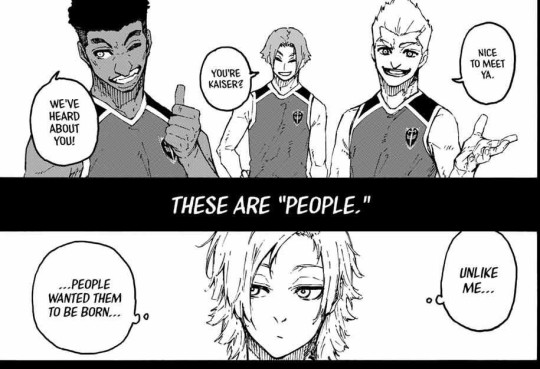
Alternatively, Hoshi’s translation of Kaiser’s monologue goes like this:
These guys are “humans.” Different from me, they were born wanted “humans.”
Having been abandoned by his mother and growing up abused by his father, Kaiser’s sense of worth is so low that he thinks he was born without it—which is wrong. Everybody is born deserving to live.
But Kaiser thinks otherwise. He sees himself as not even human because nobody wanted him alive. Still, he has this strong desire to live—a desire that had first made itself known to him at this moment:
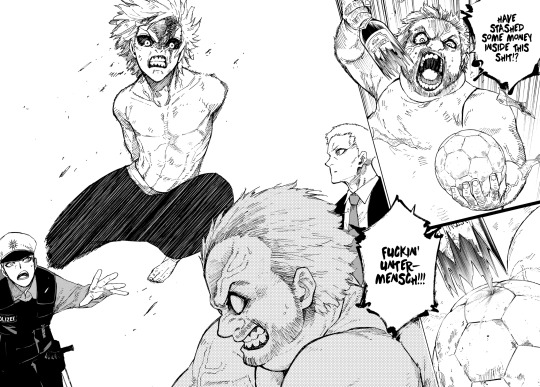
Right before this, he had looked so dead inside:
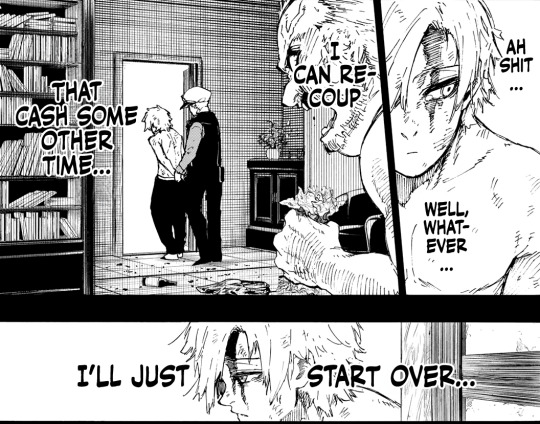
He didn’t flinch when the cops came to arrest him. He didn’t try to fight for the escape money he had stashed away. He was so passive and tired and helpless that he might as well be truly dead.
But at that moment his father was about to destroy his soccer ball? A fire lit up inside him. A fire so bright and strong that he got to beat seven cops while handcuffed.
That fire was the love he had for soccer. All his life he’d been in a passive position, but when he fought for what he love, the reins of his life got transferred into his hands.
And in that moment, Michael Kaiser, for once, was truly alive.
Now, he’s living his life in constant search of that fire—or “proof of his existence,” as he puts it.
However, Kaiser has misunderstood what that fire is. After all, how can he recognize love when he’s never been loved?
Only pain and violence are familiar. Thus, it is honestly no surprise when he misattributes “proof of existence” to ��inflicting malice on others, living on inside them as a scar.”
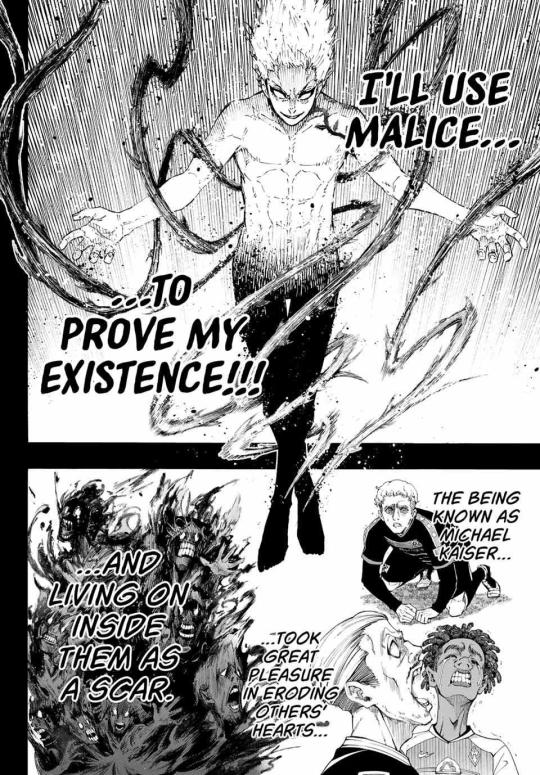

For Kaiser to grow, he has to redefine “proof of existence.” How can his own existence depend on the number of people he defeats? That’s unhealthy. And as with Rin’s problem, it’s just seeking answers outside of himself.
But for Kaiser to even begin redefining it, he must first learn to recognize love for what it is.
Love was the fire that was lit inside him. He must go back to it. (Like how Bachira awakened by going back to how he used to play as a child.)
Love is also the main thing that sets Isagi apart from him—the former having been raised by loving parents and having companions sincere to him—so it’s crucial that he learns this if he wants to defeat Isagi.
How can he do this? With the way he was raised, I don’t think Kaiser can learn love on his own. He has to learn it from others. But before that, he must see himself as “human.” While he still views himself as “non-human,” Kaiser won’t be able to connect deeply with “humans” and welcome any love from them.
And this is the crux of his problem...
Kaiser has made attempts to be more “human,” but...
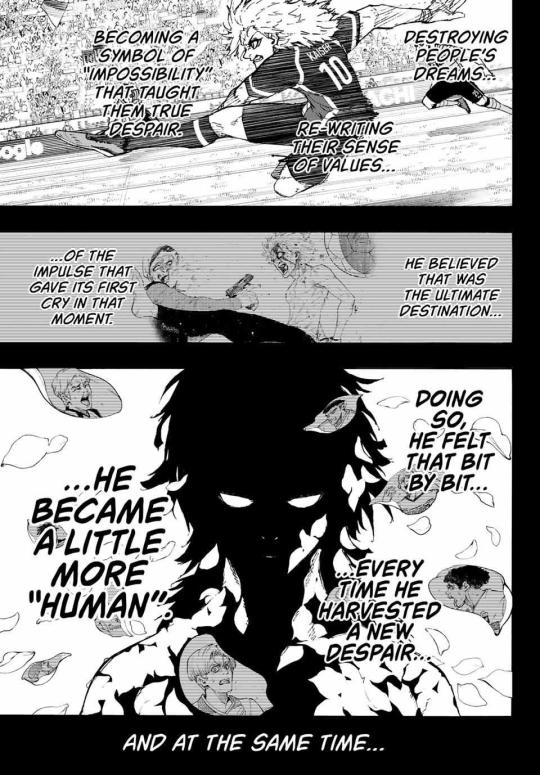
... he’s going about it so horribly wrong 😭😭😭
@galaxynajma also sent this question:
What do you think is the new reason for why kaiser does this every morning: His morning routine consists of: standing before the mirror naked, gazing at himself while having a conversation (to himself), getting into the mindset that nothing is impossible, and then smiling while thinking ‘this is me’. (Trivia from Blue Lock wiki)
“This is me” is Kaiser reaffirming to himself that he is becoming more “human” when he sets out to achieve the “impossible.”

How to be Human 101
Okay, fuck, to be completely honest, I have no idea! I didn’t expect to get this psychological while I was writing 🫠
I had… written myself into a corner. But anyways, I’m gonna try seeing this through...
So, I’m no psychologist, but… I relate on a deeply personal level with Kaiser’s “human vs non-human.” But in my case, I had used the words “normal vs not normal.”
(This is gonna get a little bit personal, but bear with me!)
This distinction was something I strongly felt during my peak depression years. I felt like nobody truly understood me because they hadn’t been through what I had been through. Whatever the doctors said just went from one ear to another because I couldn’t trust them. In my head, I had categorized them as one of the “normal” people—their lives were so put-together and they were so in control and on top of things! Not like me, who was drowning.
I also slowly distanced myself from friends because they, too, were the “normal” ones.
One friend, however, stuck around. She didn’t mind me going missing for months without a word. And whenever I showed up again from who knows where, she would always excitedly welcome me back as if I never even left. And this was the friend who I thought to be always better than me in every way because she was prettier, smarter, and had a better financial status. So I never really expected her to get me.
But oh, she did. I found out that she wasn’t “normal,” too. She too had her own problems, and we got to share our sorrow with each other...
So, I guess what I’m trying to say here is that...
It’s not really a matter of erasing the distinction between “human” and “non-human.” It’s enough, for now, that Kaiser finds another “non-human” like him, and with whom he will slowly start to feel “human”—worthy of living and being loved.
I know Kaneshiro isn’t fond of therapy talk, but for Kaiser, I think it’s a must that he gets to open up to someone. He doesn’t have to share the full story. He just has to be sincere about it.
And who is the closest “non-human” that we have around Kaiser who’s also unwanted by his family?
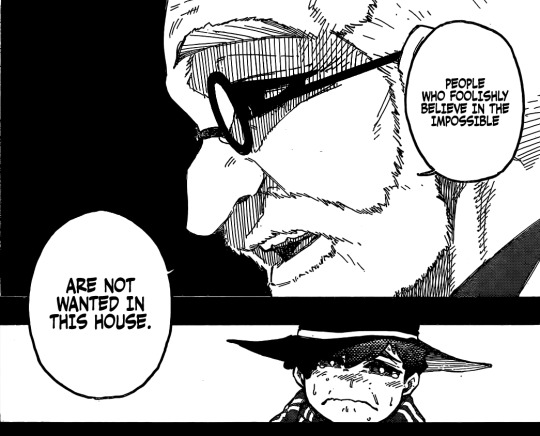
Ness.
This doesn’t even have to be about shipping. And I know their relationship is looking pretty grim right now because of how Kaiser has been treating Ness since the beginning, but...
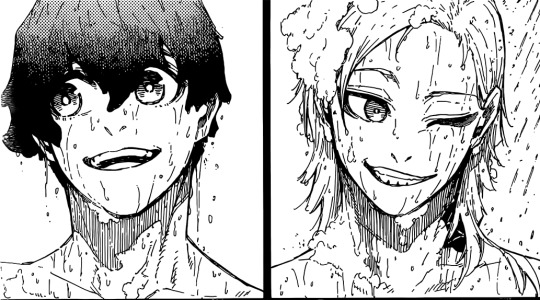
...I still believe that this, at least, was real.
Together, they can learn what it is to be “human.”

In summary, for Kaiser to awaken, he must first resolve his internal problems. To do this, he must...
Find a fellow “non-human.”
See himself as “human.”
Recognize love for what it is.
Redefine his “proof of existence”
Thank you for coming to my TED talk, *bows
---
Okay, so I don’t normally do this at the end of my posts, but I just recently launched my Alpha Reading Service. If you liked my analysis above and would like me to review your story the same way, do check it out!
Or, if you don’t need any alpha reading, consider tipping me on Ko-fi instead. Thank you!
#*checks time#THIS TOOK ME ELEVEN HOURS TO WRITE HOLY SHIT#AAAAAH#I still have to prepare for my classes 🥲#i’m going back to reality folks#take this and go!#michael kaiser#blue lock#michael kaiser meta#blue lock meta#michael kaiser analysis#blue lock manga#miyamiwu.meta#miyamiwu.src#kainess#alexis ness
186 notes
·
View notes
Text
Blue Lock volume cover analysis
An examination of unusual features and chains among the 31 volumes released to date. Subject to revision.
Like this? Want to reference these points in your own analysis on Reddit, YouTube, wherever? Go ahead! A shout out to this post is appreciated. Straight up plagiarism isn’t.

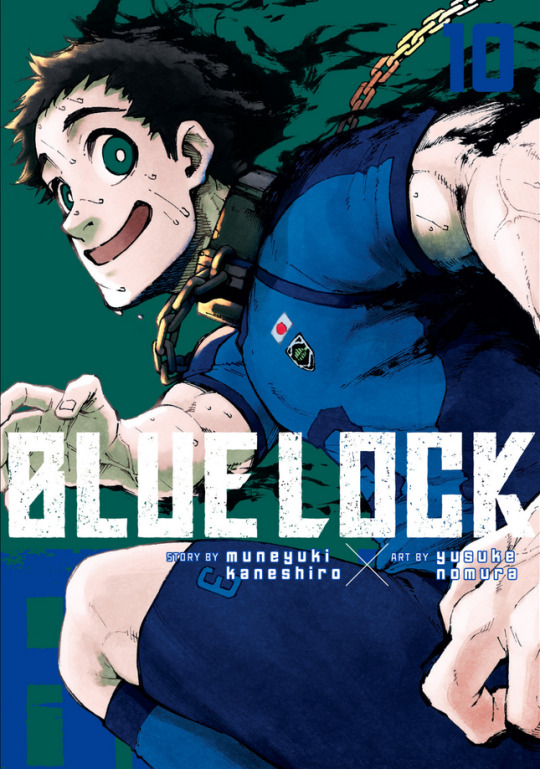
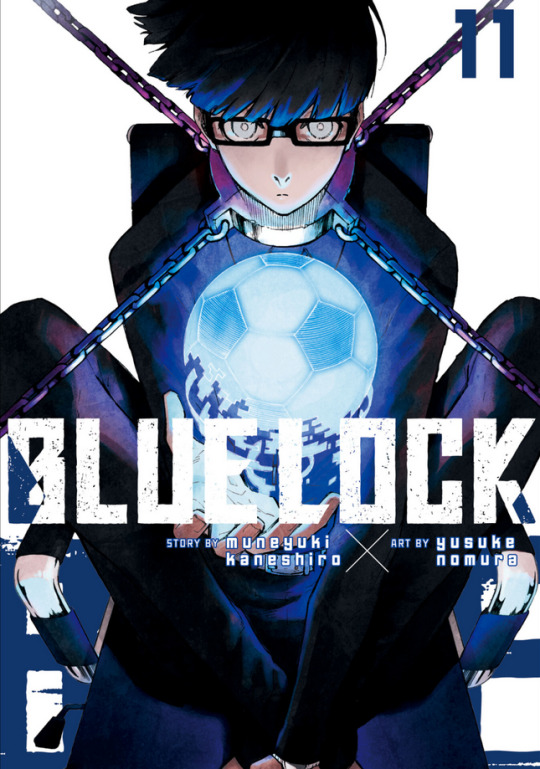
Volume 8: Mikage Reo
Reo's chains are noticeably shaded green. Guess whose eyes glow green when they're fired up...
In addition, @thyandrawrites has a theory that Reo ties/reties his hair up as a way to maintain emotional composure. The volume covers tend to represent the character's personality or struggles in some sense. If so, this is an early nod to the emotional trials Reo endures during the series.
Volume 10: Tokmitsu Aoshi
No chain weirdness here, but Tokimitsu is surrounded by black gunk in his cover. This may be a visualisation of his anxiety and the way he copes with it: running at speed and bulldozing through his opponents.
Volume 11: Ego Jinpachi
Ego's cover depicts him totally immobilised by the four chains bound to his neck. To date, no other character has been more restrained by the chains. This likely represents that Ego's fate is utterly dependent on the outcome of Blue Lock. His cover also suggests that Blue Lock (and football) consume Ego's life.


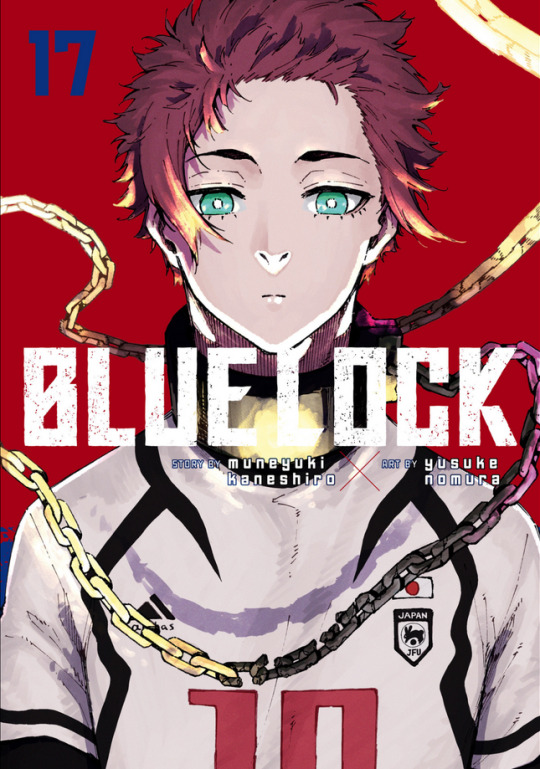
Volume 12: Shidou Ryuusei
Shidou's chains have a blue glow, much like Sendou's in volume 27. This glow is far closer to Shidou's collar however. It could imply that Blue Lock is the beginning of Shidou's pursuit of football.
He's also depicted with demon wings. The collar or chains don't impede his movement significantly, unlike other characters. In addition to portraying his incredible physicality, this could also visually represent how Blue Lock has failed to subdue Shidou.
Volume 16: Oliver Aiku
Aiku's chains are wrapped tightly around his arm and he's pulling them taut. The chains themselves appear rusted and cracked, most notably on his collar. This could represent Aiku's relationship with football. He grew jaded with being a striker in high school. Becoming a defender, then the match against Blue Lock, revitalised his enthusiasm. Hence, the chain is holding fast: he's just as ensnared by football (and Blue Lock) as the others.
Volume 17: Itoshi Sae
Sae and his chains are bathed in radiant gold light, which is associated with both divinity and wealth. His chains crumble in one place, and remain barely intact. I offer two interpretations for this. Firstly: unlike the others, Blue Lock does not have a strong impact on Sae—his success as a footballer is completely independent of it.
Secondly: if we take the chain to represent Sae's footballing career, the crumbling chain could allude to a time when football negatively impacted him. Perhaps whatever happened in Madrid? But he came back stronger, as the rest of his chains appear even more golden.
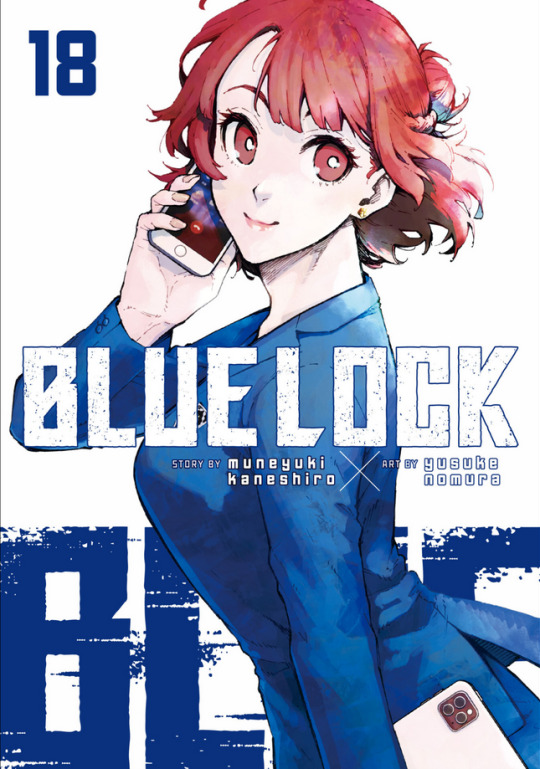
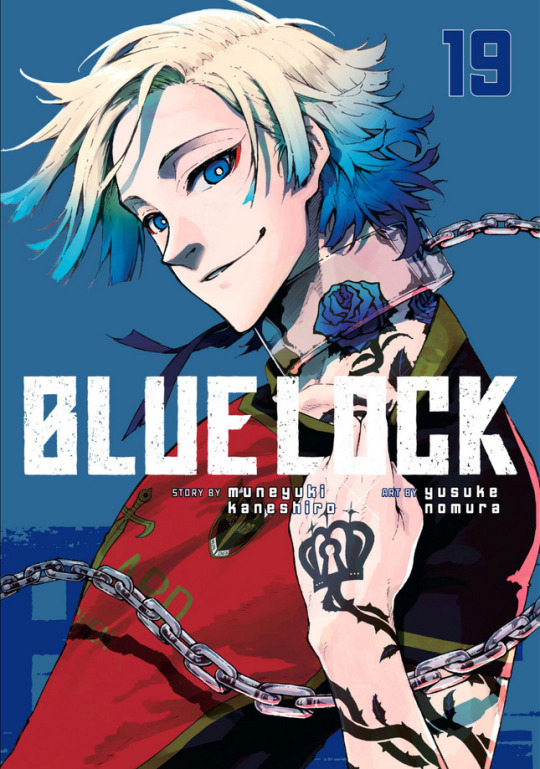

Volume 18: Teieri Anri
Anri is the only character depicted without chains or a collar. While working with Ego is a prison sentence in its own right, the artwork suggests that her ambition and future isn't connected to the outcome of Blue Lock. It can also be interpreted as a nod to the hierarchy within Blue Lock. Anri is Ego's boss and thus, she is free while he is constrained. However...
Zoom in on the reflection on her phone screen. It appears to reflect a wide grin—which can only be one person's. Taking into account her passivity in chapter 247, this detail positions Anri as Ego's accomplice: willing to do his bidding, no matter how amoral.
Volume 19: Michael Kaiser
Kaiser's collar and chains are made of glass, through which his blue rose tattoo is visible. As chapter 243 told us, a blue rose represents the impossible to Kaiser. Glass chains suggests that his ego or ties to football are fragile, and could be broken easily. Symbolically, glass can also represent transparency. As a character, Kaiser is upfront about his talent and desires. Nobody is in doubt about his footballing mantra or his intent to undermine Isagi.
Volume 20: Alexis Ness
Ness's chains are entwined with blue rose brambles, all but for a short length to the top right of the image. While Ness came to love football independently, seeing it as magical, the rose brambles show that his connection to football is now inseparable from his devotion to Kaiser. It also reflects that Ness would not be a professional footballer without Kaiser, as per chapter 242/243.
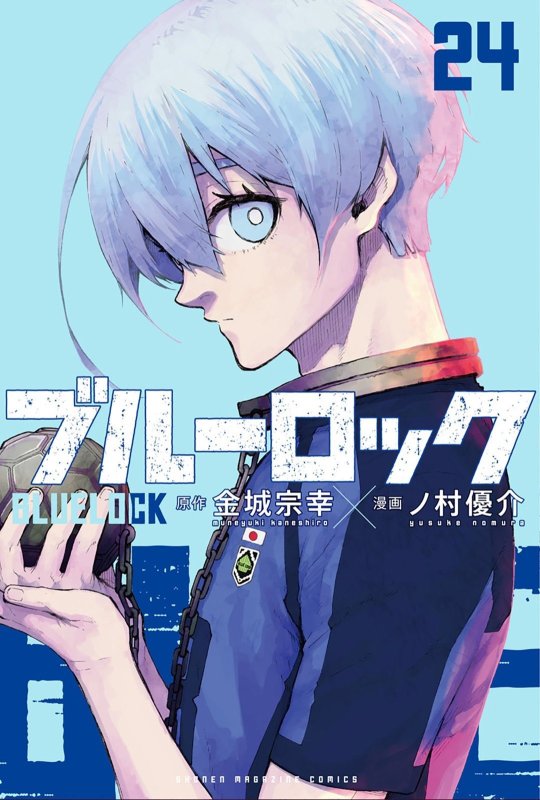
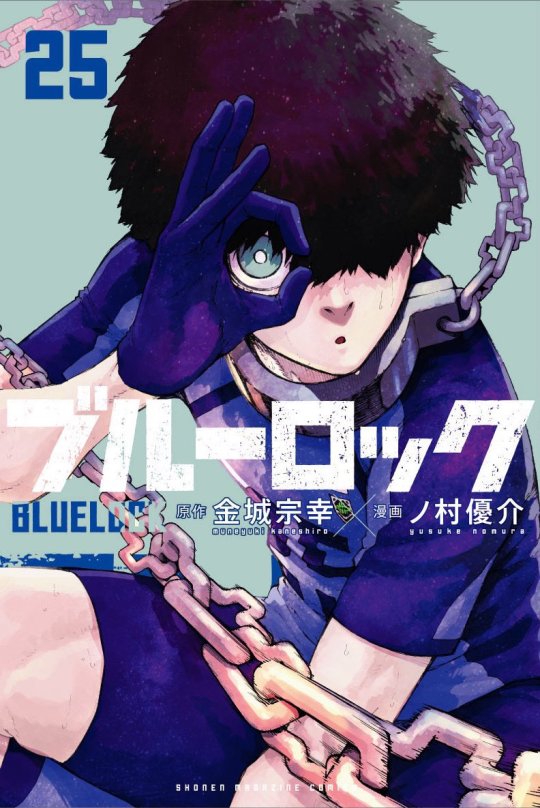
Volume 24: Hiori Yo
Hiori is the only character shown holding the end of his chain, which is secured by a football-shaped weight. This suggests that Hiori himself is the one in control of his career, rather than external forces. Football is a burden to him, albeit something he can carry. Therefore, Hiori is not ensnared by the chains (or Blue Lock) to the same extent as other characters. Appropriate for a character guaranteed to succeed as a footballer, but who ultimately may not choose to pursue it.
Volume 25: Niko Ikki
Niko's volume cover is hilarious. I'll leave the explaining to Tomo-tan, who lays out the humour and genius of Niko's cover in this great Reddit post.
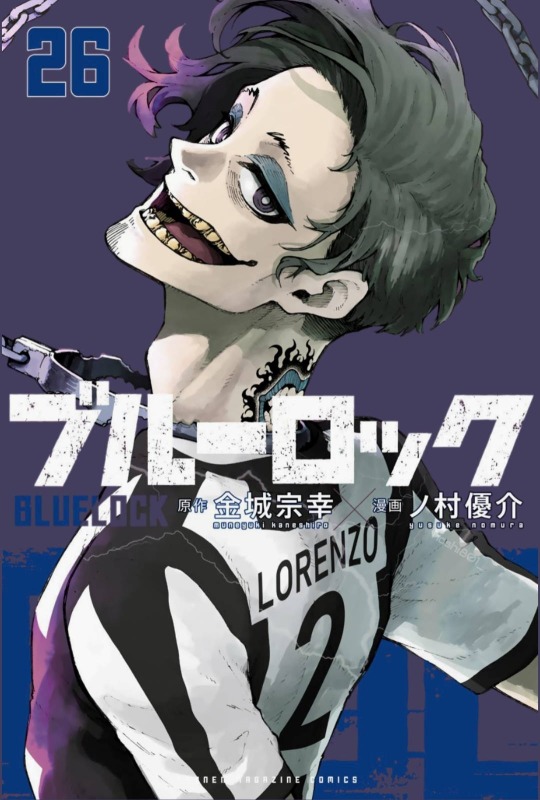
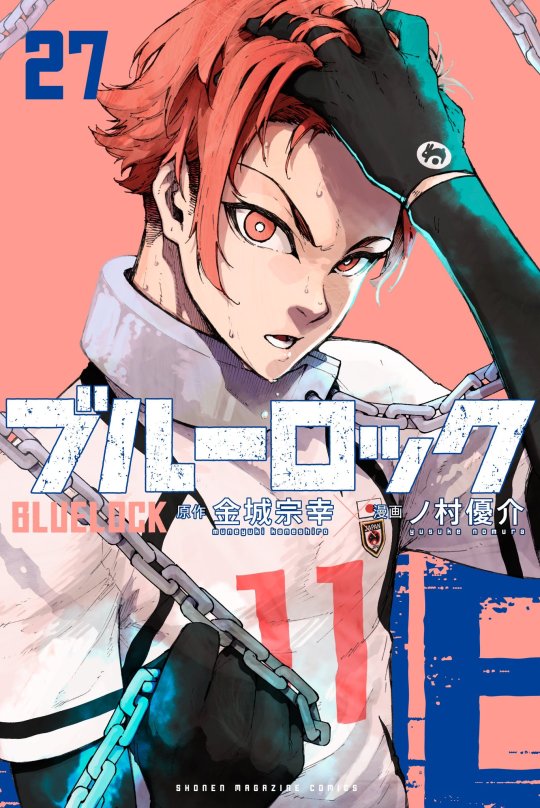
Volume 26: Don Lorenzo
Members of the New Generation World XI have no chill when it comes to their covers, and Don Lorenzo is no exception. His collar shows bite marks, as though chewed through. Gold teeth are good for more than caramel popcorn, apparently.
Lorenzo's chains are accompanied by what looks like electricity. This suggests that football reanimated Lorenzo from near death, as per chapter 216. It's a visual nod to his playstyle, which resembles the incessant pursuit of a zombie. Guess we can call him Snuffy's Monster.
Volume 27: Sendou Shuuto
A blue glow appears on Sendou’s chains, halted from travelling further by his fist. This may represent the threat Blue Lock poses to Sendou's footballing career. He's already been kicked as the striker of the national team; now in the Neo Egoist League, he must battle for a place on the new U20 line-up. No easy feat, as his sweaty face implies.
Another detail worth mentioning is that the trajectory of one of Sendou's chains appear to align with the chain Aiku's pulling in his cover. This similarity, and the fact that they're both holding their chains, may be interpreted as a nod to their status as former U20 teammates—likely the only ones that will make the new team, going off the latest NEL auction table.



Volume 29: Nanase Nijiro
Debated adding him, but eh—I wrote up Reo's cover. Nanase's illustration (incl. the chains) is shaded green… similar to Rin's eyes and aura colour. His chain jerks right and left in a nod to his ambidexterity.
Volume 30: Tsurugi Zantetsu
Another gag cover on par with Niko's, albeit less clever (intentionally?). Zantetsu's chain is made of shapes you'd associate with a toddler's learning shapes toy.
Volume 31: Charles Chevalier
Charles's cover is a double whammy. He gets two colours like Aiku, reflecting his capricious nature. Gold and metallic are representative of his high worth. The background spirals are a definite nod to the Cheshire Cat, a character Charles states he likes in an end of volume character profile.
The chains are shaped like the devil emojis that appear in Charles's dialogue. The chains also feature two materials: an alternating light and dark metal with no evident pattern. This perhaps represents the way his passes are hit or miss, or the way he decides who to send passes to on a whim.
#I'd love to see what people think#also hit me up if you think I missed something in another cover#blue lock#bllk#blue lock analysis#bllk analysis#blue lock meta#bllk meta#blue lock anime spoilers#boinin talks bllk#long post#mine#mikage reo#tokimitsu aoshi#ego jinpachi#shidou ryusei#aiku oliver#itoshi sae#teieri anri#michael kaiser#alexis ness#hiori yo#niko ikki#don lorenzo#sendo shuto#nanase nijiro#tsurugi zantetsu#charles chevalier#updated: 1 October
231 notes
·
View notes
Text
wait a minute because im reading the itoshi brothers backstory chapters and sae… i soooo get you. they could never make me hate you twin. growing up being told you’re a prodigy only to be let down once you’re thrown in the real world and have to face the harsh reality that you’re mediocre at best… and the resentment that comes with it… the self loathing that one inevitably must begin to harbour because its our fault we couldnt keep up or maybe, just maybe its other peoples fault for planting that seed of delusion inside of us that we’re meant for greatness and then the bar is set too high and its not our fault we couldn’t rise up to the challenge or that that weight was put on our shoulders… and somehow giving up on that greatness feels liberating, like rebellion. i’ll become the best midfielder in the world. everyone expected him to become the best striker in the world yet he realised he didn’t have what it takes to be it, he wasn’t good enough. so he rebels so he can feel in control again. he’s shutting down other people’s (rin’s) expectations for him. he’s letting go of that weight. he wants to become the best midfielder because that is something thats within reach, that is something he can control. and i can imagine just how freeing that might’ve been for sae hence why he didn’t want rins dream to rely on him.
#breaking my silence to talk about yet another soggy 2d boy#idk maybe im just projecting but…… its tragic i think. hes tragic and i love tragic.#i think i might add on to this later. i still have to finish reading the last chapter 😭😭#itoshi sae#bllk#bllk meta#sae itoshi#bllk manga#bllk sae#blue lock#blue lock manga#blue lock meta#blue lock spoilers#.bllk
90 notes
·
View notes
Text
I’m assuming people know this but isagi’s “ego types” he’s ‘created’ are real theory
like how flow state is an actual thing, not just made up for blue lock
self-style ego vs world-style ego is literally just intrinsic vs extrinsic motivation

So world-type (aka isagi, hiori, reo etc) would be extrinsic motivation and self-type (aka shidou, bachira, nagi) would be intrinsic motivation
I hope this is taken further with in the manga and is actually discussed with all players, not just kept as theory in isagi’s head
#intrinsic vs extrinsic motivation theory is talked about a lot with sports so it doesn’t surprise me that kaneshiro would incorporate it#he’s just explaining it though isagi’s pov/wording#it’s 11pm and I have work at 7am tomorrow morning but I might read up on more when I get home after 4#bllk#blue lock#blue lock meta#meta#do I even tag this as meta cause I kinda just stated a fact
70 notes
·
View notes
Text
I really like that blue lock is a series that doesn’t allow it’s players to get comfortable in a supporting role. With a sport like this, we naturally come across quite a few duos, and they tend to be composed of a dominant striker and a support position passer who believes wholeheartedly in the other’s goal making ability. spoilers ahead
We see this with reo and Nagi, and Kaiser and ness and recently with isagi and hiori.
And to a certain extent, it works. These strikers need someone who can keep up with them and bring their goals into fruition. This is one way the striker can get stronger. We even see Julian from France actively working to create this partner for himself in the latest match.
But blue lock is making a point to show that the type of ego that is focused on another is not the best path forward for either player. This is first shown in nagi and reo. They have to break up to become stronger. I watched some videos and read some stuff online and the consensus seemed to be that reo gave in a bit too easily. It would have been better if he continued on his path without nagi. And the awesome bait and switch is that the narrative AGREES. The signs are all pointing to a breakup part 2. I think having them working together again served two purposes. It reaffirmed their relationship and shared goal. And it proved that they aren’t ready to work together again yet. Reo’s ego CANNOT be nagi or they will not make it to the world stage. This is really smart because it sets up their shared goal to be playing together again in the future to win the World Cup. They cannot evolve if they are codependent.
The same goes for Kaiser and ness. Each was using the other as a crutch. For Kaiser, ness allowed him to defend his throne and for ness, Kaiser became his whole reason for playing. We’ve seen this story before. In Order to grow and evolve, the duo has to split and Kaiser leaves ness to continue chasing his evolution. I think he knew on some level he was also holding ness back. Im hoping we get to see ness evolve during this match or the future in a world without Kaiser.
Finally— hiori. Now this one is actually special because unlike the others, hiori’s ego isn’t actually isagi, rather it is to develop the worlds greatest striker. Isagi just so happens to fit the bill at the moment. The play style and position is close to reo and ness but the intrinsic motivation is a bit more self centered than theirs. I think this is probably more aligned with the narrative’s ideal version for this role. It’s also very similar to Charles who has a selfish play style despite being a primary passer(idk the right term for this position sorry). That said, we have to wait and see if it ends up working out for him.
Long story short, if you want to pass, be someone who chooses where to pass, not who to pass to.
If you want to strike, be able to do it with your own power, not reliant on someone giving you the ball.
That way once the ultimate chemical reaction occurs, it becomes truly spectacular.
Thank you for coming to my TedTalk.
#blue lock meta#blue lock analysis#blue lock#bllk#cactus writes#isagi yoichi#reo mikage#nagi seishiro#michael kaiser#yo hiori#alexis ness#charles chevalier
61 notes
·
View notes
Text
I definitely think that this moment is all of the little moments where Isagi zeroed in on just defeating one person and trying to become the best piling up to his ego becoming pure hubris. Like before it was just Isagi slowly becoming more and more like a machine who works towards a goal, but I fear he has fully embraced his role as an analyzer of the field, to the point where he's abandoning the thing that really made him standout as an analyst to begin with:
His empathy. I read a post a while ago from someone who talked about how it's actually because Isagi is so empathetic that he's able to read so much about his opponents. And I really agree with that, because Isagi Yoichi is the most empathetic person the field. Or at least he used to be before he became enamored with making goals and scoring. Then he only cared about trying to score because he brought into the Blue Lock philosophy hook, line, and sinker.
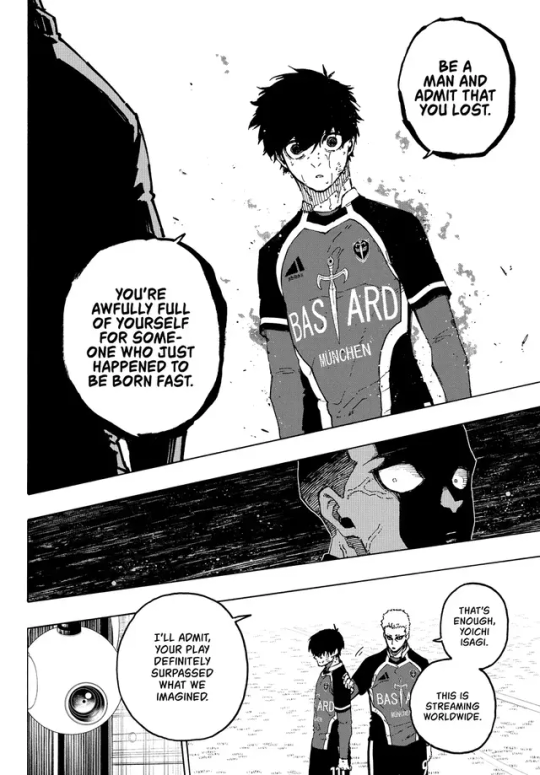
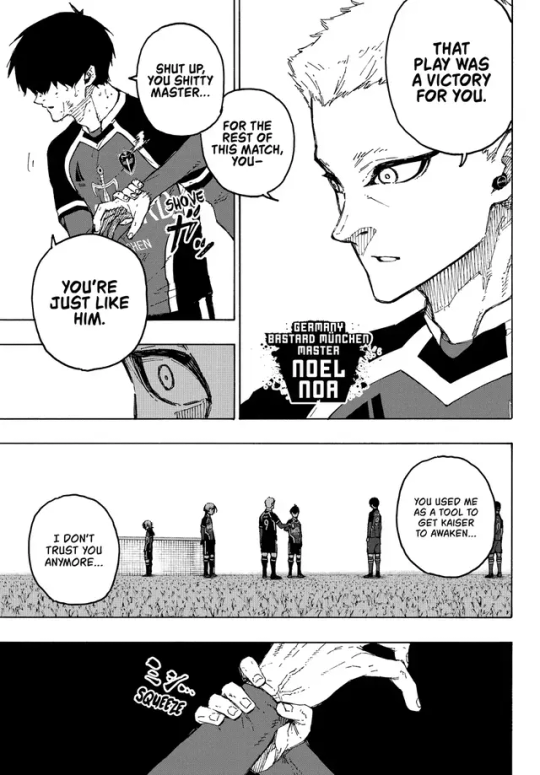
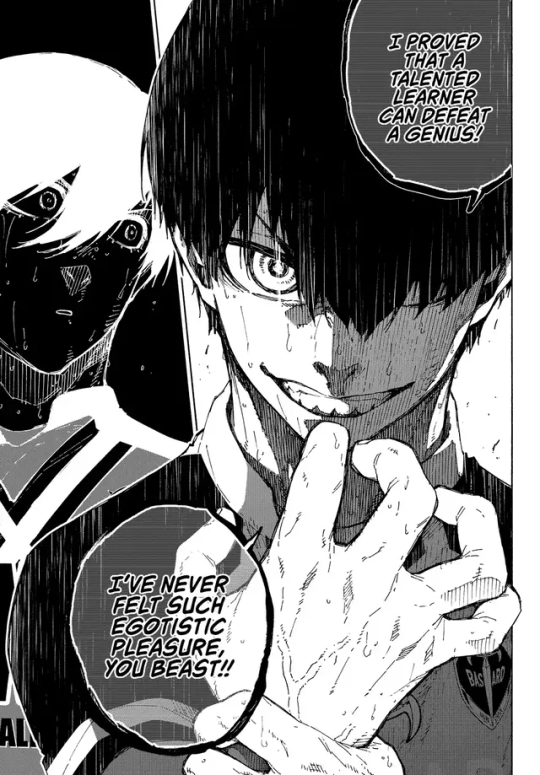
I think this moment is a result of Isagi abandoning the things that he felt were holding him back from becoming a "genius" like the others, and that thing was literally his ability to understand another person by thinking about what it must be like to be them, essentially. He's only thinking about how they can fulfill their actions on the field, and not why and that was a huge core of early Isagi's mindset. Thinking about others isn't a selfish act, and is the least egotistical thing you can do. But it's what got Isagi ahead for the most part, and a key part about being an egoist isn't getting rid of the parts that make you unique, it's turning those things about you into weapons for you to use to your advantage.
It's a little ironic that he'd turn to Kaiser in the end for help defeating the "neo egoist league" all together, because Kaiser JUST learned the whole "I need to be more empathetic and caring of others to truly learn the value of myself" lesson, he had this whole inner monologue where he truly realized that using other people like cogs in a machine wasn't what made him a great striker. Or even a great player, and that his detachment to other people was the thing that was secretly holding him back, not the other way around.
And here is Isagi, becoming just like Kaiser, abandoning the thing that made him special as a striker for what he thinks he "needs" and not what is actually beneficial to him.
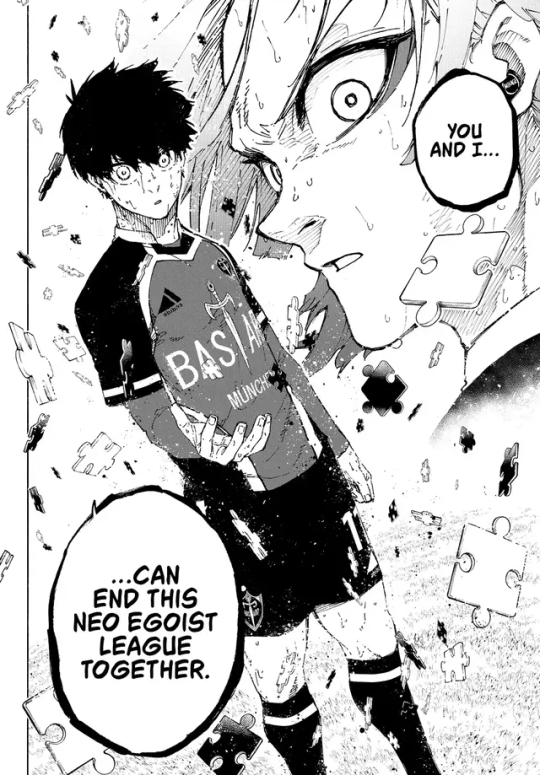
In a weird way, its almost like Kaiser and Isagi have swapped places. Isagi is the unfeeling antagonist who wants to use this all feeling "side character" to get ahead, and I think he's going to fail because he doesn't realize that he's falling behind in the wrong places. Early Isagi from before this arc would have whole moments where he'd talk to his teammates and even learn about how they think specifically, and even their past achievements, the things weighing them down etc.
But this Isagi has not once done that, and that's what has led us here. To an Isagi who is wholly addicted to the feeling of making goals that he has forgotten to consider the other part of what makes a striker great.
A part of me is still also thinking about Bachira in all this, and how we haven't seen in literally a year at this point. And I am wondering if when we do see them, it will be like two sides of the same coin (because if I remember correctly Bachira's team hasn't won a single game for some reason, even though Bachira's scored the most)
I can definitely see Isagi becoming full on "Logos" in his ideas, while Bachira is completely "Pathos" and is honing too much in on his creativity and not enough on how to make that translate into a victory. (i also just miss bachira in the story </3)
#blue lock manga#bllk spoilers#blue lock spoilers#isagi yoichi#micheal kaiser#julien loki#noel noa#itoshi rin#blue lock manga spoilers#bllk meta#blue lock meta
41 notes
·
View notes
Text
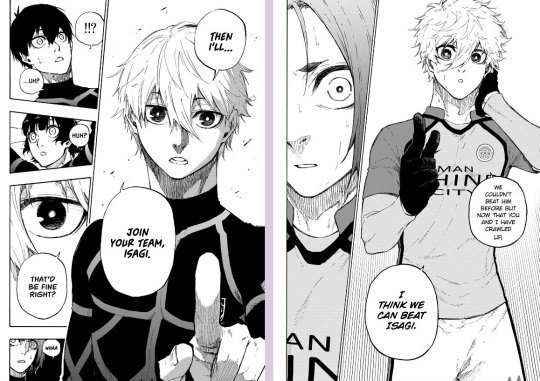
Two things:
I wanted to put these two pages together to see the difference in Nagi's body language in these two similar moments. In the first, he seems more forward, confident, and determined. In the second, he's got his hand on his neck, a gesture that shows he's feeling nervous (in that whole sequence he keeps doing similar motions, touching his neck/shoulder/back of his head). I don't have anything to say about it, it just makes me sad ;v;
I realised that the layout of these two pages is extremely similar?? Is it just in my head?? Idk what this means, but it's got to have been intentional. It has to mean something in the narrative, right??
66 notes
·
View notes
Text
Itoshi Sae, Physical Contact, and the Exceptions: Rin and Shidou
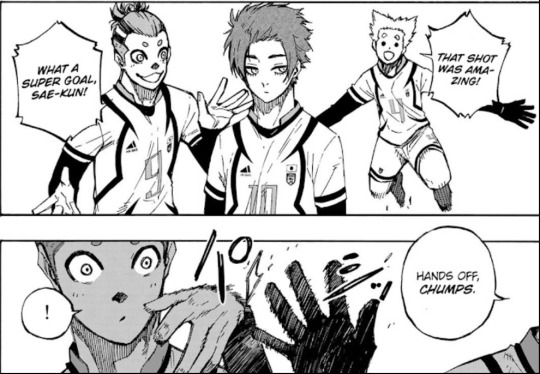
As of Chapter Ch 214, the only two people we see Sae allow to touch him are his little brother…and Shidou Ryusei.** Post (S)pain, it’s only been Shidou.
**I’m going to argue that Sae allows Shidou to jump on his back. And I mean 'argue' in the lightest sense.
-
Quick preface: Just organizing and posting notes I took on the subject for characterization in a fic (they are, therefore, biased). I’m not claiming that no one has ever touched Sae, just that the manga only shows a select few occasions. We’ll go in chapter and not chronological order. For the most part.
-
The first time the manga shows us anyone trying to initiate contact with Sae is with these two clowns (JFU President and U-20 “coach”) in Ch 107. Hardly surprising that Sae wouldn’t shake the hands of people he so clearly doesn’t respect.
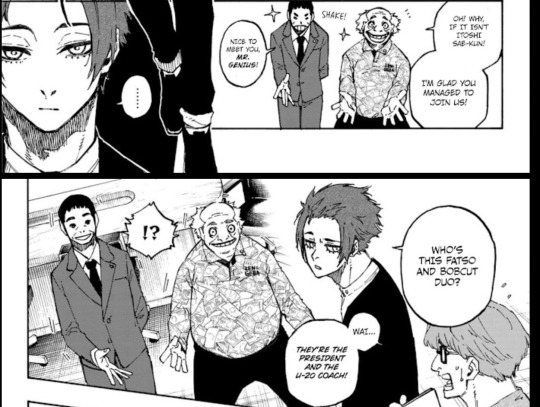
Every expression in this panel is priceless.
Next up, Ch 111:
Aiku and his proposal are plainly of more interest to Sae than the JFU bozos, yet Sae nopes right out of Aiku’s ‘gentlemen's agreement�� handshake. And then threatens to nope out of the whole match if the U-20 Team can’t meet his standards.

We see Sae being rushed by celebratory teammates several times. Not once do we readers see any of them actually succeed in throwing an arm around him pre-Spain, in Spain, or post-Spain. Until Shidou.
Post Spain (Ch 116):
Sae has just scored a goal crazy enough to have Isagi think, “The leading actor in this game is Itoshi Sae!!” The crowd is going wild, the U-20 Team is rushing Sae in joy, …and Sae literally slaps them off: “Hands off, chumps.”
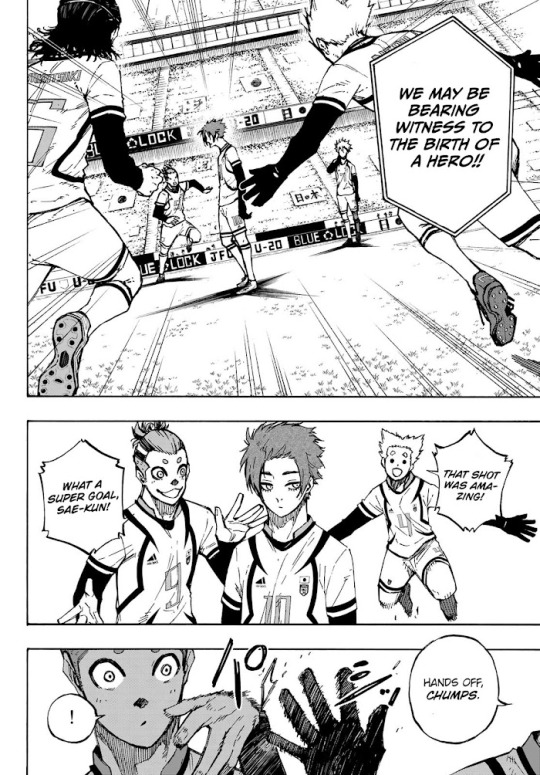
Poor Fox Kid and Not-Bokuto. They seem so darn sweet.
Now, a blast from the past.
Pre-Spain (Ch 123):
I don’t know about y’all, but I can so clearly see Little Sae ducking right out these guys’ arms—in a more humorously standoffish way. Like how we see Rin sidestep Isagi (coming right up!). An imagination is all we got here.

Spain (Ch 125):
Now in the mysterious (S)pain… Hopefully we’ll get more than a glimpse of it one day! Would Sae have dodged the Real Madrid Youth Team guys? Would he have numbly endured it? Would he have slapped them off? Etc.? The manga, again, leaves us to wonder. (My money’s on the second one.)

Once again, I’m definitely not saying Sae’s teammates have never succeeded in tackling him in celebration. Just that it’s notable we, the readers, don’t see it. Yet.
I’ll conclude with some pre-Spain Itoshi Bros cuteness, but let’s talk some post-Spain Itoshi Bros parallels first.
Ch 121
Poor Isagi. 😂 Rin sees him coming with a little “!” and dodges his charge like the plague with a grumpy lil “Hmph.”
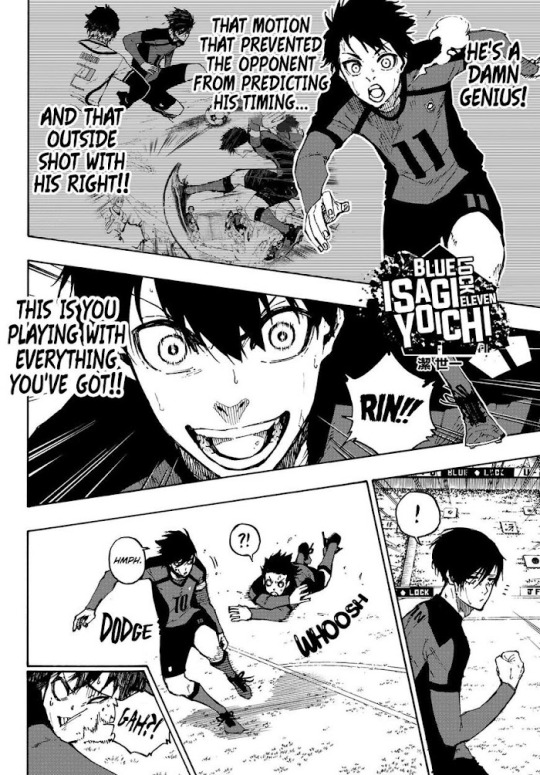
Rin, now away from Isagi, goes right back to business in the next panel.
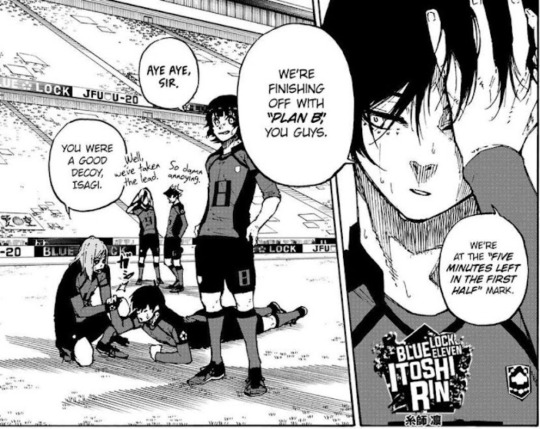
Ten chapters later, we have a Sae parallel.
Ch 131
Just like Rin, Sae sees a celebratory missile coming right at him with a “!” and a less than enthusiastic expression—yet Sae doesn’t dodge Shidou.

Shidou definitely takes off like a bat out of hell (ha). But do we really think Itoshi Sae of the New Generation World XI couldn’t have even sidestepped—like his little brother—if he’d really wanted to?
I think Sae allows Shidou his moment of clingy celebration. Especially in light of the Rin and Isagi parallel. Remember, this was immediately following Shidou’s unbelievable Big Bang Drive—a goal that had even Sae showing open surprise on his face (Ch 130). Shidou becomes the first one shown to have jumped on Sae in celebration.
(Real talk, though: someone please give Kitsunezato and Neru a high five!)
The next page…
Both pursuers of the Itoshi Bros end up with a hard impact on the ground, and yet….
Sae doesn’t tell Shidou to f— off after throwing Shidou off him. Shidou doesn’t get an icy “Hands off, chump” like Fox Kid and Not-Bokuto. Sae doesn’t stalk off (he actually lingers and seems to chat while Shidou just chills on the ground and gives him a lil thumbs-up). Sae tells Shidou, “You have to get a hat trick, remember? Then you’d get my number. Hands off until then, you horny demon.” Untillll being the operative word (...one of them, anyway 😅). Not only does Sae let Shidou latch on, Sae banters with Shidou.

This is outside the point of this post, but Sae looks…sad? nostalgic? when Shidou first jumps on him. It doesn’t last long, but it’s there. Perhaps relating to the panels I’m about to bring up. (Addressing what may have prompted Sae’s “Gross” and “horny demon” reactions + his punch/tackle is also outside the purview of this post 😅 Same with speculating on what the helllll these two were talking about below.)

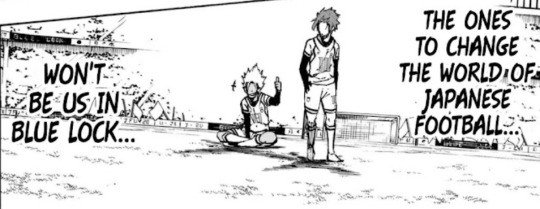
Concluding with some Pre-(S)pain Itoshi Bros
Ch 123:
We see Little RinRin as the original No Touchy exception. And it’s so wholesome.
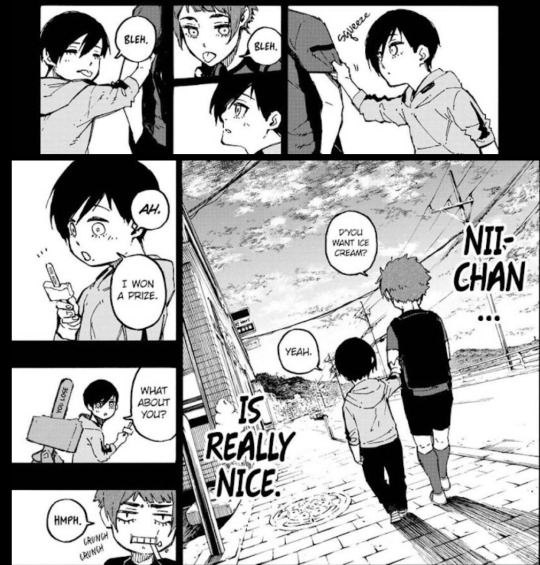
And Sae actually reaching out to Rin and being affectionate. Maybe we’ll see it again one day.
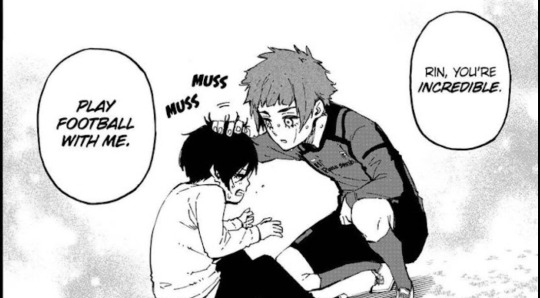
Ch 124
Look, the Itoshi Bros are capable of high fives! Or, they were, anyway.
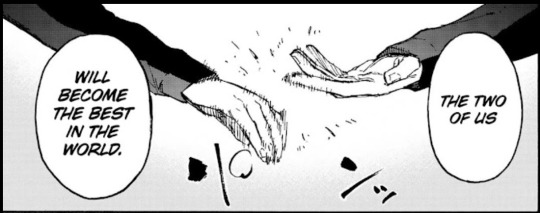
Unlike Sae, we actually see Rin's teammates grabbing him in celebration, pre-(Sae’s return from) Spain.

In conclusion...
So far, the manga shows Sae breaking his general Kuzco Rule with only two people.
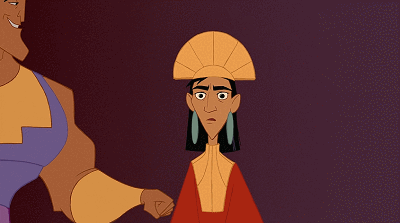
Pre-Spain, Little Rin was a very obvious exception. Post-Spain / currently and more subtly, Shidou is the only exception we've seen. Is it a respect thing? A soft spot? Emphasizing Sae is an "untouchable" player? Some combination?
As for canon… I really hope we see Sae and Shidou become friends. They’re both so alone but seem to bring each other to life. I also really hope we’ll see Sae accepting his teammates’ celebration one day. Just imagine Sae pulling off a crazy pass or stealing a goal at the World Cup, both Rin and Shidou rushing him in joy, the rest of the team on their tails! Or maybe something smaller, like just celebrating a cool move in practice. I think we’ll see it eventually. Just like I think we could see Shidou act as a bridge between the estranged Itoshi Bros.
You’ll find what notes / “meta” I’ve already posted under #xoxoBlueLockNotes. Will probably organize and post more somewhere in here!
PS: Check out @bluelockhalloweek for spooky Blue Lock fun! 🎃 Halloween is just around the corner!
#itoshi sae#shidou ryusei#blue lock#Itoshi Rin#sae x shidou#RyuSae#Itoshi Brothers#blue lock meta#sdse#Isagi Yoichi#oliver aiku#RinSagi#shidou ryuusei#bllk#Sae itoshi#blue lock u20 arc#Itoshi Sae meta#shidou x sae#sesd#xoxobluelocknotes#blue lock manga#TFEC#Itoshi bros#Neru Teppei#Kitsunezato Teru#xoxobluelock#blue lock manga spoilers
614 notes
·
View notes
Text
Nagi's "Hidden Path"/ Loophole
*featuring Isagi, Bachira, and Rin analysis*
I've been thinking a lot about how Nagi represents a "hidden path" in Bluelock, and the ways in which it seems the main manga and episode Nagi disagree on whether he should succeed- the key issue being his relationship with Reo. He plays soccer for their collective dream in a manga where depending on another character for your motivation is treated as soccer suicide, which should doom him, but his own manga starts with the statement that his genius is shaped by Reo - framed as a good thing.
I've said in the past that maybe Nagi will succeed by Episode Nagi's standards, but fail by Blue Lock standards, and I still think that would be an interesting path to take, but rn I wanna discuss the alternative that Nagi succeeds by both standards, even if to a lesser extent in the main manga since Isagi is the MC. And we're assuming here that his relationship with Reo isn't permanently severed in a way that makes him more similar to every other Bllk character bc that would make him much less interesting and also remove the "hidden path" aspect that we're expecting here.
So for him to succeed by both standards, I think what essentially needs to happen is that Nagi represents a loophole or caveat in Blue Lock's philosophy. And to understand why that would be the case, we'd have to understand WHY playing for anyone but yourself is a bad thing in Blue Lock. And there are plenty of examples to draw from.
Isagi and "All for One"
We can start with the "One for all, all for one" team Isagi was in- the most extremely dependent soccer we see. I'll be drawing from Isagi's Light Novel for this, because it really just spells it out. First, let's look at the reasoning for that "all for one" given in response to Isagi's request to shoot more:
“Up until now, You could have won matches with your individual skills, but high school isn’t a piece of cake... We win together, and become stronger together! If you do that, then you'll have double the joy! And half the sorrow!”
The reasoning given here isn't that the resulting soccer is better at winning games - rather there is an emphasis on safety. "the world is tough", "If we stick together, there's half the sorrow". And within that emphasis, is the implication that the individual isn't enough.
We can also see complacency in this ideaology. When Ichinan loses, the coach says
“You fought well. It’s frustrating, but this is what Ichinan is capable of now. The third years are leaving after this… and some of you might quit soccer after today but you can be proud of the days you fought together as a team." "To me, Ichinan’s soccer team…is the best team in Japan!!!”
Within this dream doping that Ego rants about later on, we can again see the acceptance on the individual not being enough - "You fought well... but this is what Ichinan is capable of now." We also see within the dream doping the injection of safety and lack of perceived agency. Because we are one unit, there is no blame, no frustration, no need for improvement. The point is the team, not to win, so be proud.
Most damning is the way we see this reflected in Isagi
There’s no need to take a risky battle. If they lose, it will be his fault and he will feel bad for the team. He makes an exquisite pass to Tada's feet. A perfect last pass.
What's emphasized here is the risk in making an egotistical decision for the whole team in believing himself good enough to make that shot himself. What essentially happens here is a devaluing of the self - " I'm not good enough on my own, its safer to trust others, trust the system, not your instincts" And that forces Isagi to not live up to his fullest potential, to chase what he wants. Until Blue Lock that is.
Bachira and the Monster
Bachira is probably the character most directly "punished" in the narrative for playing for someone else. Though I feel like punish is the wrong word because this problem with his ego reared its head and was resolved in the same game - once he realized the problem, Bachira resolved to solve it
According to Bachira's explanation
"...Until now, I was afraid of playing soccer by myself. I guess I wanted you to come save me. But, once I tried fighting on my own, like I'd done as a kid, I realized...
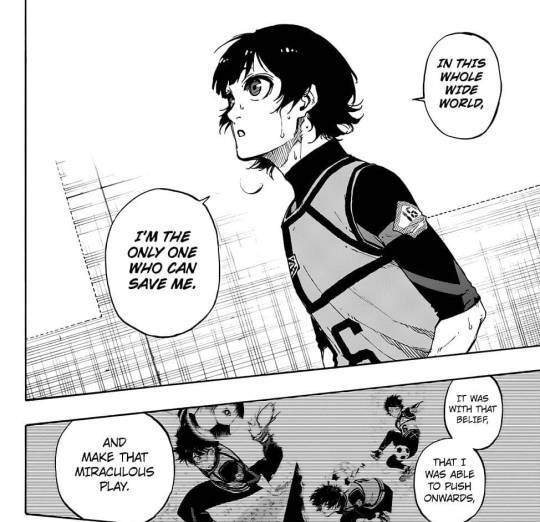
And so the problem with his habit of looking for another player when playing instead of focusing on himself was again the perceived lack of agency, and devaluing of the self. Longing for someone to play soccer with led to a dependency that negatively impacted his decisions on the field
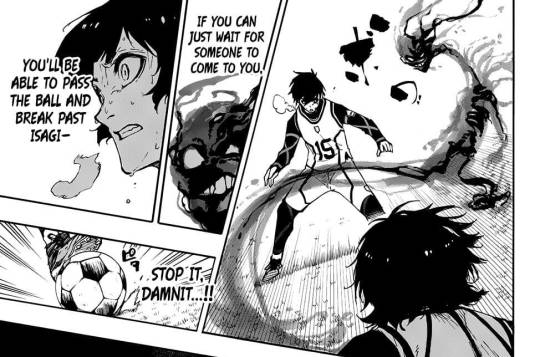
So that's why his moment of growth was breaking through all on his own to steak back Isagi and win - ignoring the idea that he should wait for someone else to help him. He needed to believe in his own agency/value to prove himself on the field and achieve his goals.
Rin and Sae
I recently took a look at Rin's Light Novel and there was a line that stood out as kinda similar to Bachira's old habit of passing to an imaginary monster before coming to Blue Lock
he understood why things were not going well. Neither their coach nor his other teammates have the slightest idea of Rin’s image of play in his head. (If it was Nii-chan, he would have made a pass here……) he thought so many times during today's practice. He jumped out in front of the goal to a position where I said, “Here!” but his teammates were like, “Huh?” “There?”
So whether you're passing or shooting, a reliance can develop, huh...
(How do Bachirin shippers feel about this parallel? haha. And what does this say about what Rin says to Bachira "But afraid of fighting alone. It is a soccer looking for someone. That luke-warm ego won't make my heart dance". Cus it seems Rin is criticizing Bachira for doing the same thing he did. What does this mean about how Rin feels about himself? (I mean.. he did already call himself lukewarm later but was he thinking about himself in that moment?))
In the light novel, I think it becomes clear one reason why Sae is so against Rin using him as his reason for soccer - it definitely affects how Rin plays when Sae is away. And since Sae becomes aware of the competition outside Japan during his time abroad, he knows that Rin's mentality as it was wouldn't be enough and thus wanted to spare him the suffering and have him give up. And this is in combination with the idea of "I've found out, that I'm not strong enough to hold you up. If you rely on me you'll fail" At least, this is my interpretation of it - but moving on-
With Rin’s last pass, they score a shot. If his Nii-chan had been there, he would have passed the ball to him in front of the goal and he would have scored it directly….. He stopped thinking. No pass is coming. That is now the reality. Anyway, the team won for the first time in a long time.
We see a lack of agency and a reliance on others once again - "If only Nii-chan was here". Like with Bachira, Rin is waiting for someone to "save" him, which limits what he chooses to attempt and stifles his potential because of how it limits his perceived agency.
We can also see this limitation in how he wants to be 2nd best after Sae - not best (de-valuing). It causes Rin to seal off his ego in order to catch up to Sae, by being more similar to Sae instead of developing according to his own unique talents/ego.
In order to catch up with his Nii-chan he saw off at the airport, he has to make the team’s victory his top priority. To do so, he must hold himself back. Hold back the you who was trying to steal the goal with everything you have using that sense of smell for the goal and assemble an attack as a team play.
Even after Sae's return he's always on Rin's mind, and this still limits his soccer. It's only after Rin declares himself lukewarm and rejects the stories others create through their relationship with him that he is able to go all out by embracing his own personal style, rather than focusing on others.
Back on Topic!
So in summary, what is wrong with depending on others? What causes Blue Lock to default to individualism? Ultimately it seems like its the resulting lack of perceived agency - the idea that you can't do things without other people present. By constraining yourself into a narrative with other people, you limit what you can do, and you limit what you think you can do by molding yourself to their vision. Thus, your potential is stifled.
How can Nagi and Reo become an exception to this reasoning? Well, maybe Nagi's decision to leave Reo during 2nd selection is part of the key.
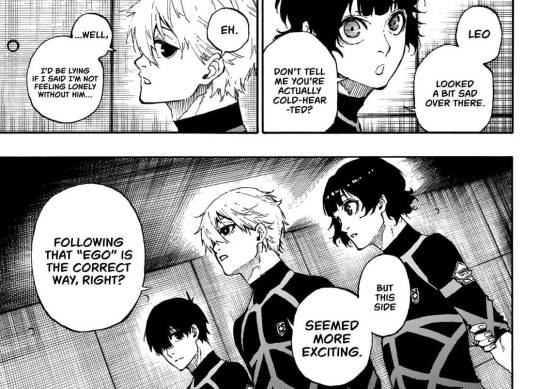
We know from Episode Nagi and Manshine that Nagi wants to improve for the sake of his and Reo's collective dream. And he (correctly) identifies following soccer that challenges/excites him as the proper way to improve.
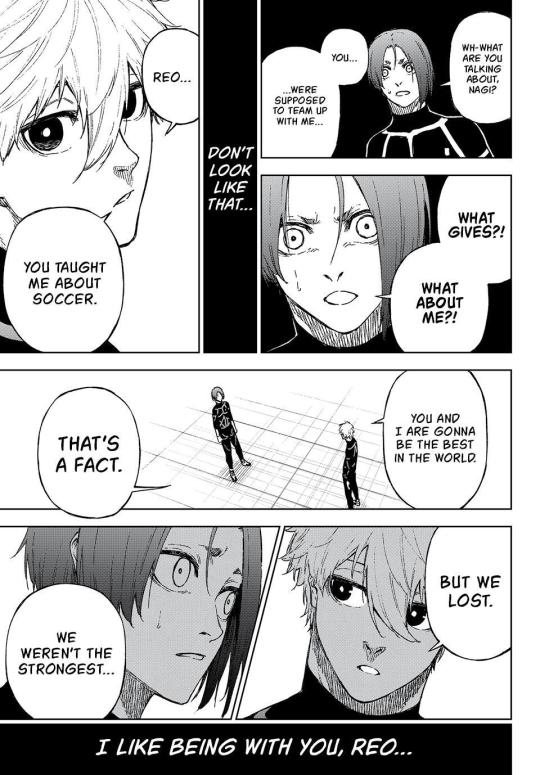
Here, Reo identifies them playing together as a must, but Nagi corrects him and saying that them being the best in the world together is a must, saying (in his head T-T) that he likes being with him, but that in order to protect their dream, Nagi needs to change.
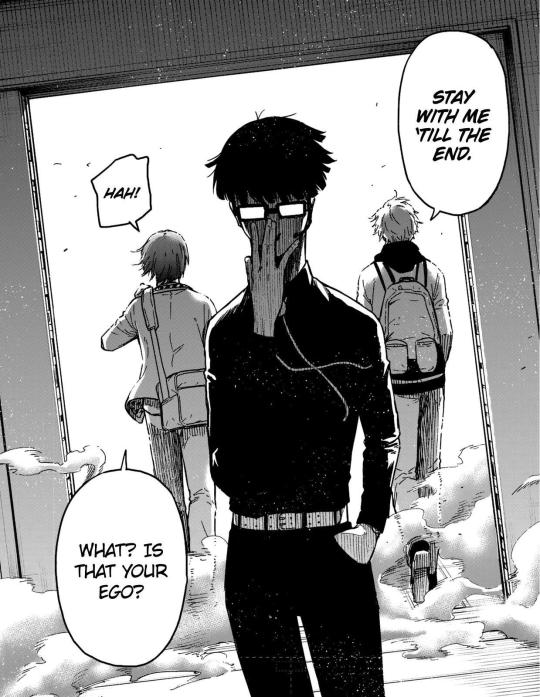

It's actually pretty much spelled out here. Nagi says he's fine with Reo playing with other people, but insists that Reo stay with him till the end. Its ok to play soccer with others, but keep me in your heart always. In other words, I don't mind not playing together, but you and our end goal is always in my heart.
This is different from Isagi, Bachira, or Rin's situation because in those cases, the team/monster/Sae were considered as key to success. However, in Nagi's case, success is key to Reo. It's completely reversed. It's that nuance of "I play soccer to play soccer with you, to win with you" vs. "I play soccer for you, I win for you". Because "playing together" is not a requirement for winning, it no longer acts as a constraint that restricts agency. Nagi's concept of being together separate from playing soccer together saves their partnership from being the same as the others and frees him to (for example) join Isagi to improve.
You can see more of this in epinagi
The Tag Game
You might say this is a bad example because Nagi relies on Reo to get him un-eliminated, but by Nagi's "I figured you'd do that, Reo..." we can guess that this was more from laziness than a belief that he needed Reo's help. Indeed, when Reo's in danger of being eliminated himself, when their dream is in any real danger, Nagi takes it upon himself to solve the issue
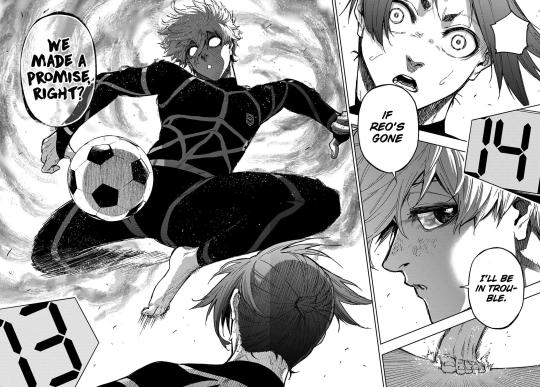
They didn't solve the problem relying on teamwork/partnership or anything. Nagi solved the problem because they're partners.
Playing Against Barou
The next time their dream is "Challenged" is when Barou says "Becoming the world's best striker means you'll be alone until you die", essentially a challenge to the viability of Nagi and Reo's dream. Nagi's response to that is to run off and instigate a 1v1 with Barou
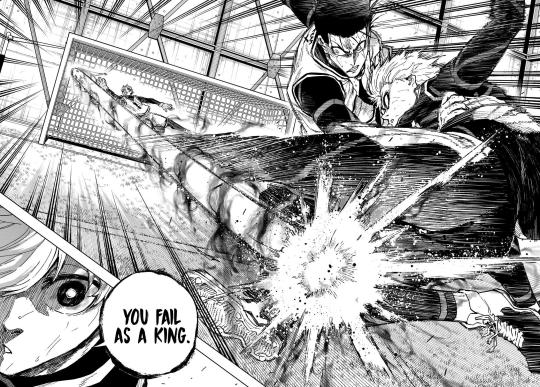
So again, rather than deny Nagi options, his partnership with Reo provided the motivation to act out on his own.
Playing against Team Z
Even when they play against team Z, we see this in action. Nagi plays a more reliant soccer, his dream/Reo is challenged when he sees Reo's face, and Nagi decides to act out on his own.
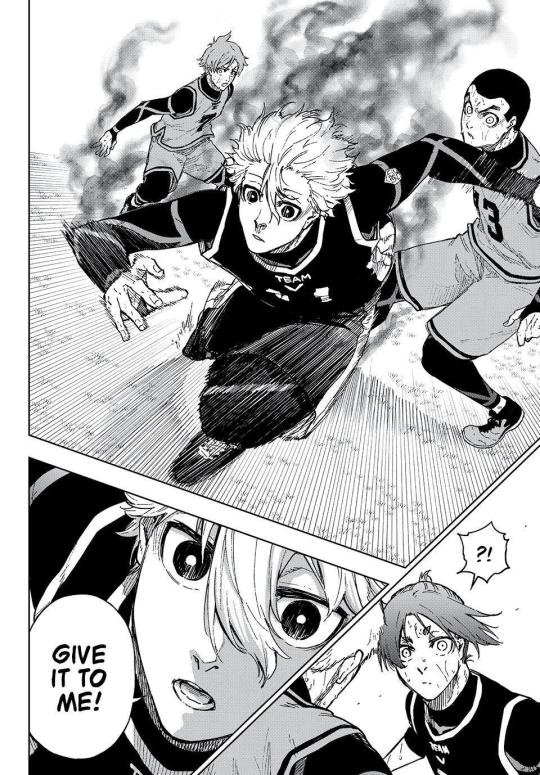
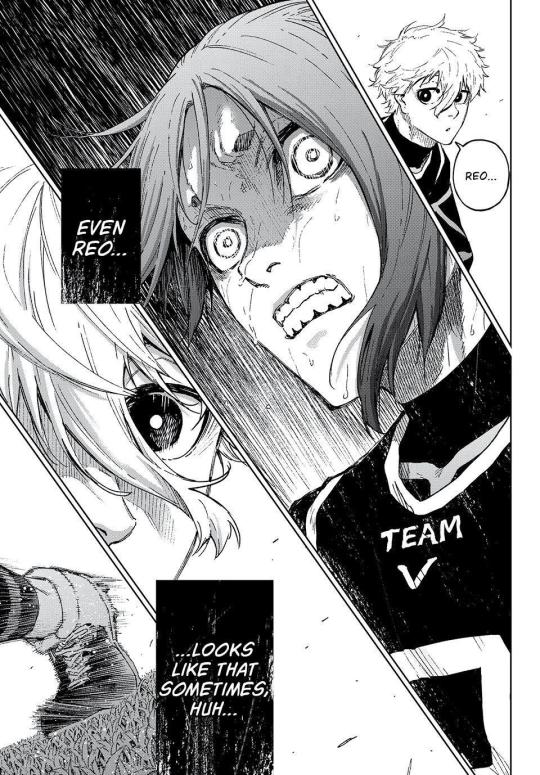
Nagi will rely on Reo for the sake of laziness, but when it comes to their dream, there's this pattern of deciding to rely less on Reo, take destiny into his own hands, and make an effort. It's really that nuance of doing something to be with someone vs. doing something for someone.
Beyond 1st/2nd Selection

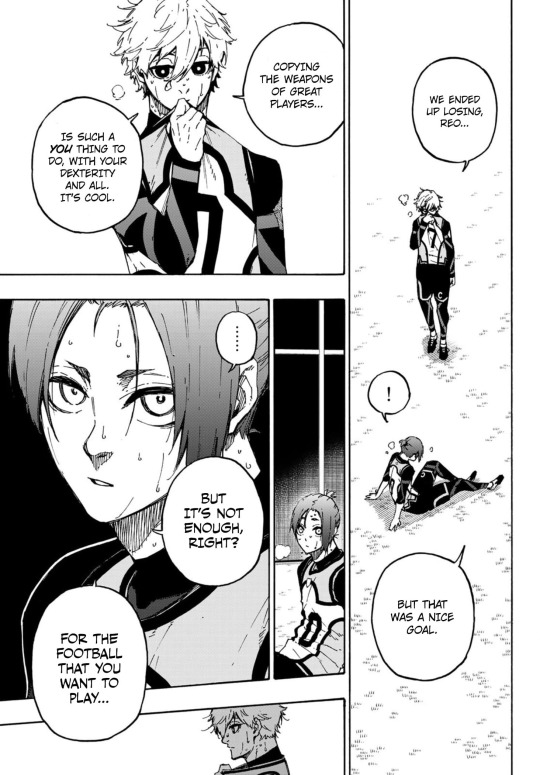
Brief mention here of Nagi's eyes shining when Reo says "But it's not enough" when Nagi praises him. I think this might be Nagi thinking its a sign that Reo in fact has not forgotten their promise and is also working to achieve it - consistent with the idea of being together without necessarily playing together (Whereas Reo is thinking the other way round - improving for the sake of playing together because that's the only way to be together)
So, where this theory hits its roadblock is the Manshine City Arc, where Nagi asks for Reo's help. But because of all the ominous foreshadowing afterwards, in addition to Ego's words that Nagi's deep ego (implied by timing of skull imagery +all the scenes I just listed to be Reo/dream-centric) is about to be tested, I think their dynamic is bound to change in some direction within the next game. So, their relationship is still in development and the theory isn't necessarily debunked.
**edited in addition** I think the key is that regardless of their behavior, the core of their partnership (ie their internal feelings) isn't dependency, but rather reciprocated faith and commitment, though especially with Nagi's communication and introspection issues, it may take some time for them to figure that out because Reo has no idea the faith that Nagi has in him. Reo actually assumes that their partnership can't exist without dependence - assumes its over when that dependence fades because Nagi will have no reason to stay with him, but this is him insecurely misinterpreting Nagi's intentions. They also can't really flourish until Nagi figures out his ego/motivation, though that's luckily foreshadowed to be addressed. I think with how Reo misinterprets Nagi's motivations on a shallow level in 207, and how Nagi's motivation is foreshadowed to be addressed soon, we will get nagireo communication soon timeline wise (not real life lol). And hopefully with that communication, Reo's insecurity + Nagi's motivation can be addressed and they can begin to figure out a functional partnership within Blue Lock. But really the key here is that faith and devotion don't necessitate playing with only each other in mind, while dependence/reliance does.
In terms of what will happen, I think we might finally get a confirmation of what Nagi's ego is - it certainly fits with their conversation in 207, where Reo tries to give a substitute that doesn't really fit. I'm not sure what would happen once Nagi and Reo have the clarity of understanding what Nagi's ego is though...
In Any Case!
I'm running out of fuel but just to let ya'll know I was thinking really hard about what the difference was between Nagi and Reo's dynamic in comparison to partnerships or teamwork criticized by the main manga and I did not expect the difference I came up with to be the difference between reliance and devotion. "I am not enough by myself" vs. "I will make myself enough for you". I still wonder if I'm just biased?
Plz lmk ur thoughts
link to a continuation of these thoughts - Hiori's Words, Reo's Insecurity, Nagi's Enforced Indifference
#reo mikage#nagi seishiro#isagi yoichi#bachira meguru#rin itoshi#bllk meta#blue lock meta#nagireo#reonagi#bllk#blue lock#Nagi's utter devotion lives rent free in my head#episode nagi
178 notes
·
View notes
Text
On "dream doping", or the lesson to be learned from despair
Alteratively titled: why breaking up with your high school sweetheart is vital for a career in soccer (with or without said sweetheart. Signed: Ego Jinpachi)
buckle up, this is a long one
We know that Reo went into this match with several hungups as to why Nagi would leave him behind, even going as far as asking Chigiri and Kunigami why they'd pick him

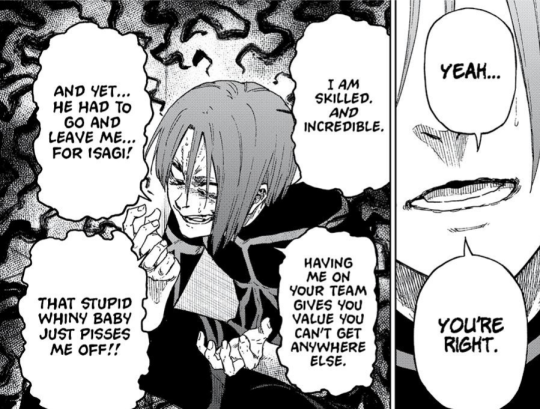
And his voice shaking (notice the wobbly speech bubble) as he repeats the validation, like he doesn't quite believe it to be true anymore. And then during the match he kept alternating between talking himself up and trash talking Isagi with increasingly frantic urgency. He needed to test his worth against Isagi and come out victorious to prove that he was worthy of being the genius' partner, yes, but one important factor is that he did all of this specifically seeking Nagi's approval. He needed to hear it from him, because it's Nagi's departure that crushes Reo's confidence in the first place. Before that moment, Reo was self-assured and cocky, even looking down on other players he felt were beneath him. But we could argue that confidence was born from a shaky foundation—the idea of staying a team with Nagi until the world cup and their eventual victory together for Japan.
I think a factor that doesn't often get brought up in Reo commentaries is that Reo derives a lot of his winning self-image from tag-teaming with a genius


And it's from "borrowing" his talent that Reo feels he lifts their collective value to genius level

And in the process, Reo also tends to undersell his own skills by comparison, and letting them stay an accessory to Nagi's brilliance,
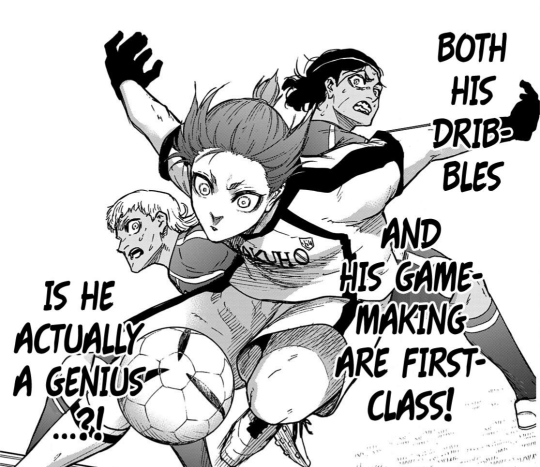
despite how it's been remarked that Reo's a bit of a genius in his own light. If he honed that potential, he could be a big threat, too. Alone.
This is by design, of course. He foils pre blue lock Rin for this reason, too. Reo and young Rin are similar in that they both consider their soccer partner the true star of the show, subordinating their own skills as just a fancy accessory to make their partners shine and become world's best with them right at their heels.
The unfortunate consequence of this is that they end up internalizing that their dream is not achievable without their partner(s), because they ingrained being a sidekick so deep into that plan that they simply see themselves unwilling or unable to chase it on their own.
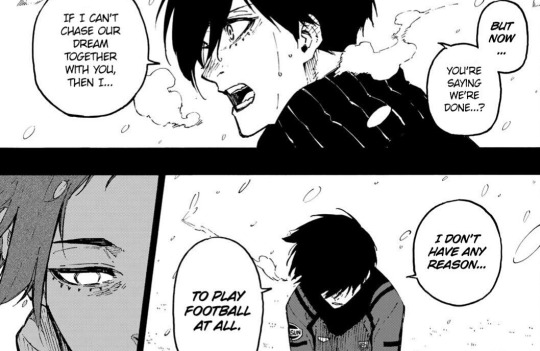
Hence why, for the continuation of their dream, it becomes vital to have their partner's approval. They just don't see the point in going on alone. Losing the partnership means losing the reason to play altogether.
Now, of course this mindset is incompatible with blue lock. Nothing really new there. Reo was always framed as the delusional oddball for signing up for the program with the intended goal of using it to make Nagi the best, rather than himself. In other words, for trying to bend the system into accommodating his dream rather than accepting Ego's philosphy and playing by Ego's rules. And of course, that plan was bound to be put to the test when Reo&Nagi got the first taste of "despair".
The series posits that despair is the feeling you get when your dream doesn't measure up to reality and threatens to crash and burn. Ego posits that there's only one way out of it that doesn't involve self-destruction. And that's avoiding the trap of the so-called "dream doping".

But what does "engraving despair" even mean in simple terms? I think Ego's point is that after experiencing a crushing, frustrating defeat, some players (the normies, or those who don't go very far) simply think "next time we'll win" without putting any active energy into changing their playstyle and rebuilding it anew to face the growing challenges and "devour" them along the way.
Think of Barou, and how he managed to come back after Isagi and Nagi made him effectively useless in the field. What Barou did was evolving into someone even more chaotic and unpredictable, and devouring them right back. Barou himself cites the despair he felt during that match as the catalyst of his growth and winning goal. In other words, instead of dream doping, Barou adapted and survived in a battlefield that would've otherwise left him in the dust.
But not every player has the presence of mind to pick themselves back up as the match is still unfolding, and when the defeats rolls around, they fold under the weight of that despair. We see this in action. When Sae evolves so rapidly in Spain and eats Rin for breakfast during their 1v1, Rin's reaction to despair is dream doping (at least at first). So is Reo's when he loses to team white. Faced with opponents that had an explosive soccer growth, they struggle to keep pace, and then refuse to face reality and admit they also need to change their playstyle to keep staying in the game.

In Reo's case, he even goes as far as saying he doesn't have "the courage to let himself be destroyed and reborn." And that defeatist attitude is what leads team white to choose Chigiri instead. A real egoist doesn't think "I cannot do it" but instead keeps fighting tooth and nail until the end.
But Reo isn't there yet. If you analyse his body language at the end of the match, it's clear he expects a rejection before it even comes. Notice his posture

Having just had a taste of the limits of his skills against strong opponents, his reaction is resigned. His stance is defensive and closed off. His arms and legs are crossed, he's the only one on the ground, his head is hung in defeat and avoiding Nagi's eyes. Even the camera angle looks at him from above, like he's already doomed himself by deciding to stay on the ground, not picking himself up. Remember, it's Kunigami who lifts him from his collar. Reo doesn't have that strength alone.

This transition here also shows it well imo. True to fashion, he only shows a reaction when Nagi's directly addressing him. A part of him is still wishing for things between them to mend, to go back to how they were. There's hope written all over his face in that second panel, but the moment he hears what Nagi has to say, it abruptly morphs into pain.
Nagi echoes the words Reo wanted to tell him when they split, but to Reo it doesn't come across as the approval he was seeking. Rather, as the opposite: while Reo couldn't bring himself to encourage Nagi to go ahead in fear that Nagi wouldn't look back (that is, in fear Nagi wasn't as attached to him and their dream as Reo was)... Nagi says them easily enough. And to Reo, that's more crushing than the loss itself because he misconstructs it as indifference towards their promise.
It all circles back to Reo's insecurity. While Nagi just showed him he's able to change even without Reo as his partner, Reo is insecure about being able to do the same because he sees them as his biggest weapon, not anything inherent to Reo alone. Thus, once Nagi mines the foundation of Reo's confidence (their team up), any step Nagi takes in an effort to get them closer to the world cup in Reo's eyes is just another step away from it (and from him). Reo always assumed they'd crossed that finish line together, that he'd build Nagi up into the world's best striker. He wasn't prepared for a path where Nagi teams up with other people, leaving Reo powerless in the sidelines—their combo (and thus himself) a weapon that outlived its usefulness.

Much like Rin declaring that he'd lose his reason to play soccer if he can't chase his dream with Sae the way they had agreed to, Reo metaphorically sees his future as the "abnormal monster duo" crumbling away (notice the decaying effect on the square with his internal narration). Instead of taking steps towards ensuring their dream still has a chance of happening in the future, he sees it as already doomed.
The thing is, Reo isn't ready to give up on it, though. He doesn't want to. I could be wrong about this but him seeking out a clean cut from Nagi came across to me less as if he was blaming Nagi for leaving, and more like he seeked a fight as self-punishment for his thoughts during the match. In the previous chapter, he tried stifling Nagi's potential and then resented himself for it. Now, his internal narration is almost goading Nagi's anger. I think it's still up in the air whether he was lashing out because he was overwhelmed by his conflicting feelings or if he was seeking out Nagi's rejection because he hated himself for not measuring up to his own standards during the match. Maybe a bit of both.
Point is, Reo is refusing to face reality. By saying "then pick me", to cite Ego, he's denying that he was powerless in the match, and putting the entire brunt of his loss onto Nagi's shoulders for not choosing him. Simply put, he's relying on Nagi to open up the door to go further in blue lock instead of growing into the player that gets to choose who to pick.
And Nagi recognizes this and feels hurt by it, cause if Reo refuses to evolve, switch up tactics and try new things, he's also implicitly refusing to go further in the program. From Nagi's perspective, it's Reo that's breaking their promise by being unwilling to put in the effort to keep staying in the game. Remember, the consequence for failing blue lock is no longer being allowed to play professionally for Japan. If Reo quit putting up a fight, his dream would be over for good.
And the story tells us, the measure of a great striker is how they react to the challenges thrown in their path. Nagi's growth happens specifically because he doesn't tie his success to Reo, but knows when to throw in other variables and when cooperating with Reo makes them stronger. In Nagi's eyes, their dream is not reliant on their combo, but their combo is a weapon that makes their dream achievable. Whereas Reo based his plan to get the world cup around his partnership with Nagi, and let his own skills lay dormant and underdeveloped cause he always defaulted to passing to Nagi to score.
But when Nagi leaves the equation for good, Reo's forced to address where his own strengths really lie and how to weaponize them to avoid elimination. That's why the chameleon awakens for the first time. It gets roused by Reo's despair, which gets "engraved" only when it dawns on Reo that their combo is not an option anymore, and it's on Reo and Reo alone to fight his way back up, evolving and devouring rivals along the way. And much like Nagi's talent for trapping, Reo's stregth was also inherent, and never just reliant on them being a team.
#blue lock#blue lock meta#episode nagi spoilers#mikage reo#nagi seishiro#nagi seishirou#reo mikage#episode nagi#bllk thoughts#this got way longer than I planned. sorry if it's messy
140 notes
·
View notes
Text

@miyamiwu
official isagi ego classification
#blue lock#isagi yoichi#blue lock meta#blue lock theory#kunigami rensuke#shidou ryusei#michael kaiser
23 notes
·
View notes
Text
What names mean to Kaiser + How roses represent curses
Thank you @gachagon @hooudie212 and @blrpr for responding to my meta prompt. Your insights helped shaped mine. And now that my classes for the week are over, I felt free to ruminate on this topic while washing the dishes earlier. I’ll now share to you guys the conclusion that I came up with.
But before I start, let me just acknowledge how @gachagon made some great points about what Kaiser’s and Ness’ names could mean and how it ties together to their roles as King and Pawn.
However, all your arguments involving name meanings hinges on the premise that Kaiser knows what everybody’s names even mean in the first place… And surely he can’t be that aware? Still, it’s an interesting take on what the author’s intent was in choosing their names.
But whatever Kaneshiro truly intended is hard to guess. So in this meta, I’m gonna focus solely on Kaiser and how his mind may have worked.
Without further ado, let’s go—

Although it’s unusual in German culture, the original members of Bastard München address each other by surname:
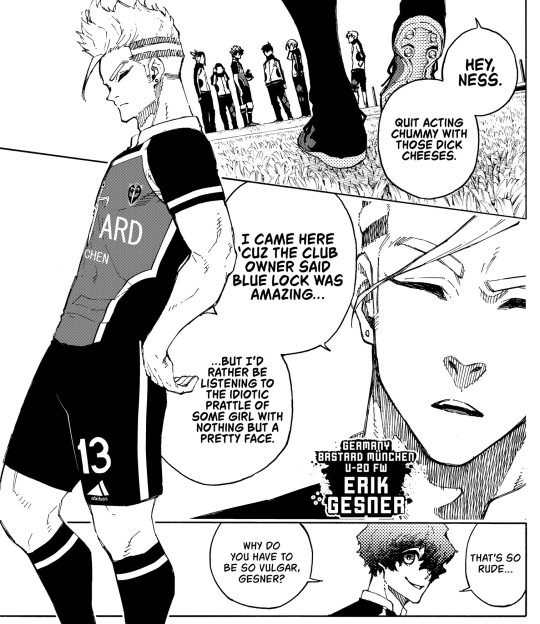
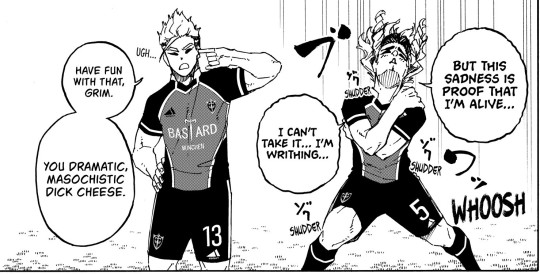
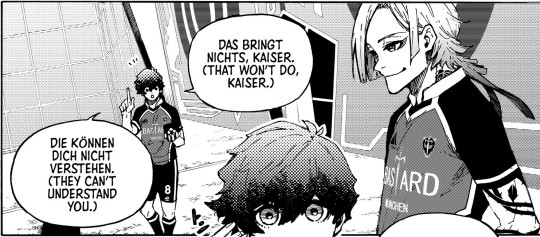
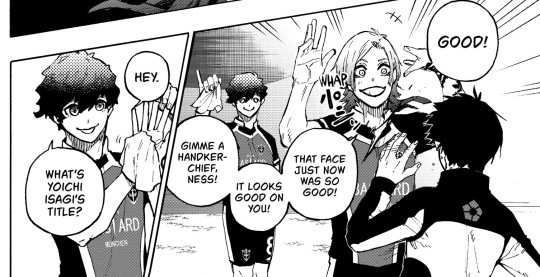
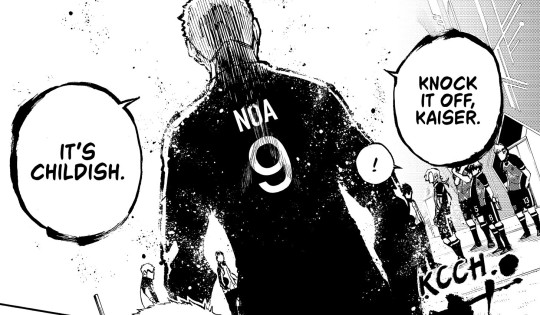
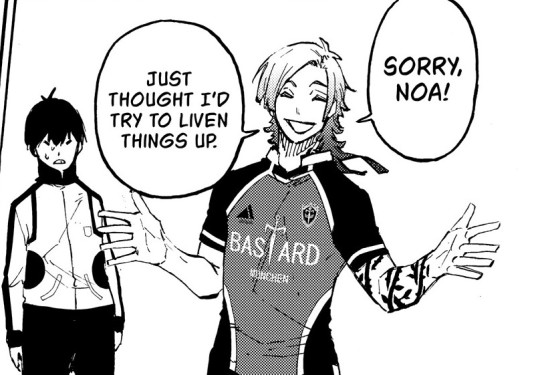
We could just brush this off as the author’s way of appealing to the local Japanese audience, considering how some foreign players in other teams also call each other by surname (e.g. Lorenzo saying “Snuffy” instead of “Marc”). (Though, there are some who do address each other by given name, like Agi saying “Chris” instead of “Prince”, which is more true to reality.)
However, this meta isn’t about those other foreign players, nor is it about Bastard München as a whole.
After chapter 260, I find it impossible to brush off the significance of names to Kaiser, especially when his backstory literally begins with an introduction of his name:
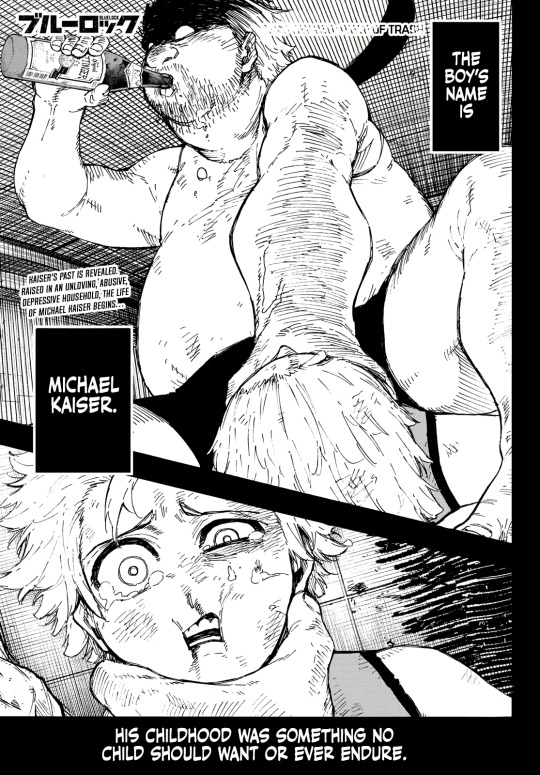
The boy’s name is Michael Kaiser.
The chapter didn’t start with “Michael Kaiser’s childhood was something no child should want or ever endure.” It started with “The boy’s name is,” in one box all to itself, distinguishing it from the rest of the text on the page.
The emphasis of the Name on the very first page tells us straight away that names are an integral aspect of Kaiser’s character.
However, despite this established importance of the Name, throughout the rest of the backstory, Kaiser is mostly referred to as “the boy.”
The one other time Kaiser’s name is brought up is this panel:

With an alcoholic, gambling addict father beating the crap out of him every chance he got, the young Michael Kaiser grew up.
But notice how the Name is included in the sentence. The first part talks about the abuse, or the cause, and the second part with the Name talks about the result.
I don’t know how accurate this would be since I’m merely referring to a fan translation, but the way this sentence is worded, plus the sense of detachment evoked in calling Kaiser as “the boy,” is sending out the message:
Point #1: Michael Kaiser is not the boy who was abused. It was the boy who was abused who became Michael Kaiser.
This point also ties in well with the last words of the chapter:
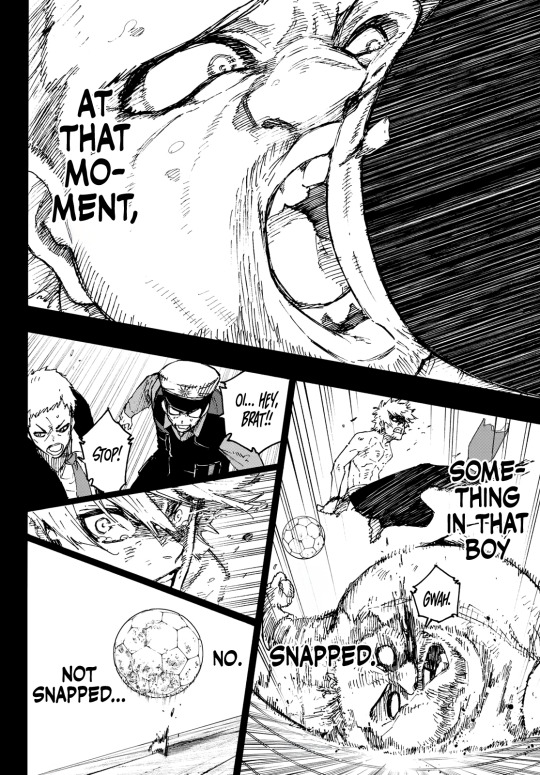
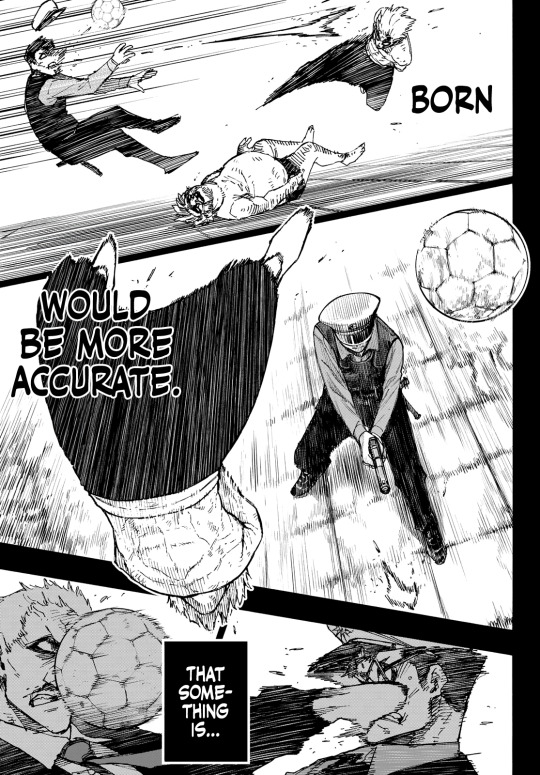
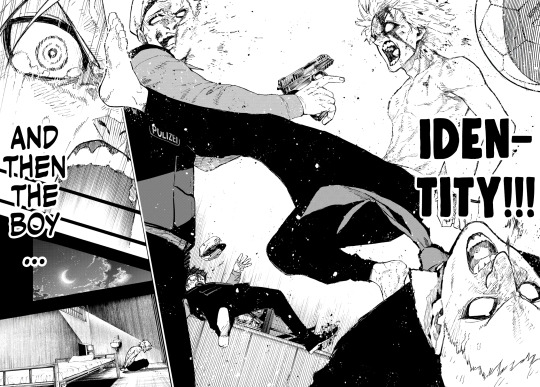
At that moment, something in the boy snapped. No, not snapped… Born would be more accurate. That something is…identity!
He was a Boy first before he was Michael Kaiser.
With this, the Name now holds even more weight.

Further along chapter 260, context on “Michael” is given:
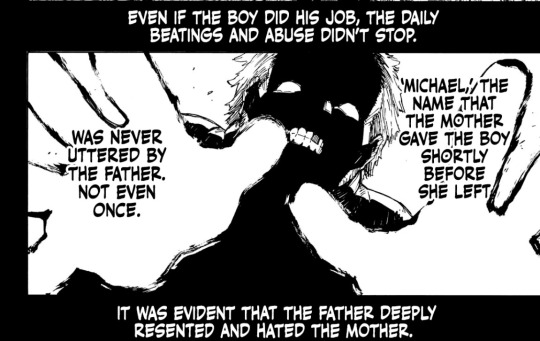
Paired with the first page of the chapter, this specific panel hammers home the notion that the Name is important.
Let me bring attention to this part:
‘Michael,’ the name that the mother gave the boy shortly before she left
and then this:
was never uttered by the father. Not even once.
Seeing that Kaiser had no friends, peers, or other adults around him growing up, it can be assumed that only the Mother had ever called him Michael.
But she left. She left after giving the name.
And the Father refusing to call him “Michael” precisely because it was given by the woman who left would also constantly remind Kaiser of this fact.
This makes two things clear in Kaiser’s mind:
The Mother who called him by his given name abandoned him.
The Father who refused to call him by it never left.
Point #2: To call someone by their given name is to abandon them.
Kaiser calling Isagi by given name is therefore his way of “abandoning” him—or, in other words, eliminating him. Yoichi is someone he must eliminate if he wants to live a successful life, like how the Mother who gave him the name eliminated him from her life to become a popular actress.
Kaiser not going by “Michael” also makes sense with how he wants to become a strong person who doesn’t give up easily (re: his conversation with Ness in c243). Why would he go by something that reminds him of abandonment when he’s trying to keep going?
As for why he goes by his father’s surname instead of just giving himself a new name entirely… it’s a lot more complicated...

From the same page as the previous panel, we have this:
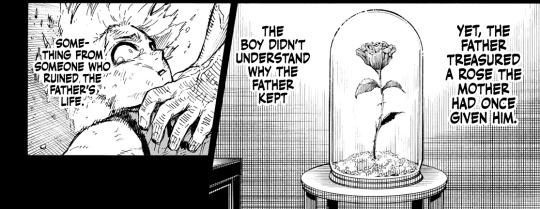
Yet, the father treasured a rose the mother had once given him. The boy didn’t understand why the father kept something from someone who ruined the father’s life.
The Father kept a rose from the Mother who left.
In the same way, Kaiser goes by the surname of the man who had made his childhood a living hell.
Both are keeping something from someone who ruined their lives.
To understand why Kaiser goes by surname, I think we must first understand why the Father kept the rose.
As @aiulbones pointed out in the replies of this post, the unwilted rose in the glass is a Beauty and the Beast reference.
There are lots of variations on the fairytale, but from what I remember of the versions I’ve read as a child, there was no one rose in a glass. Instead, there was a rose bush or rose garden. The rose in the glass—or simply, the Enchanted Rose—is actually the trademark symbol of the Disney 1991 adaptation.
In the Disney movie, the Prince was cursed to be a Beast and must find true love before the last petal of the Rose fell. To protect the Rose and possibly slow down the fall of its petals, it was encased in a glass dome.
When Belle betrayed the order to stay away from the West Wing, she came across the Enchanted Rose, inciting the Beast’s fury:
youtube
Most people think the Rose represents Love, but it’s not. If it did, then it’d make no sense for it to make the relationship between Belle and the Beast worse.
In contrast, at the end of the movie, right after Belle says “I love you” to the Beast, the last petal of the Rose falling is shown, and shortly after, the curse is broken:
youtube
(skip to 01:13 in the video)
In short, the Rose is a representation of the Beast’s curse. It does not represent love. It does, however, also represent a search for love. And only when that love is found would the curse break.
The Father keeping the Rose represents his inability to let go and move on from the woman who left him. He hates her, but he’s also still obsessed with her. This obsession has become his curse. And like how the Beast was unable to form a deep connection with Belle while he was being overprotective of the Rose, the Father is unable to love Kaiser as his son because he is still obsessed over the Mother.

Now, let’s go back to Kaiser.
I agree with @gachagon’s idea here:
I see Kaiser using his last name as opposed to his first name as a thematic symbol of him rising above the circumstances he was born in. His surname may be shared by a man who cared nothing for him, but he can make it greater than that man ever was and have it be a title befitting just him.
Also love @pinkinsect’s thoughts:
his father never actually called him michael so i wonder if that name feels foreign to him? if kaiser is a reclamation of some sort
Kaiser going by his surname is a way for him to rise above the Father who abused him. This is nice and all, but remember, Kaiser also has a Rose—the blue rose tattoo.
Roses represent curses.
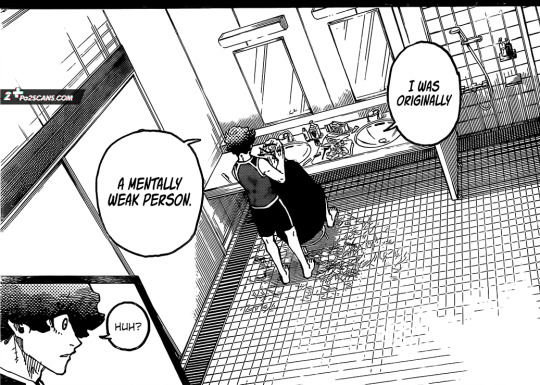
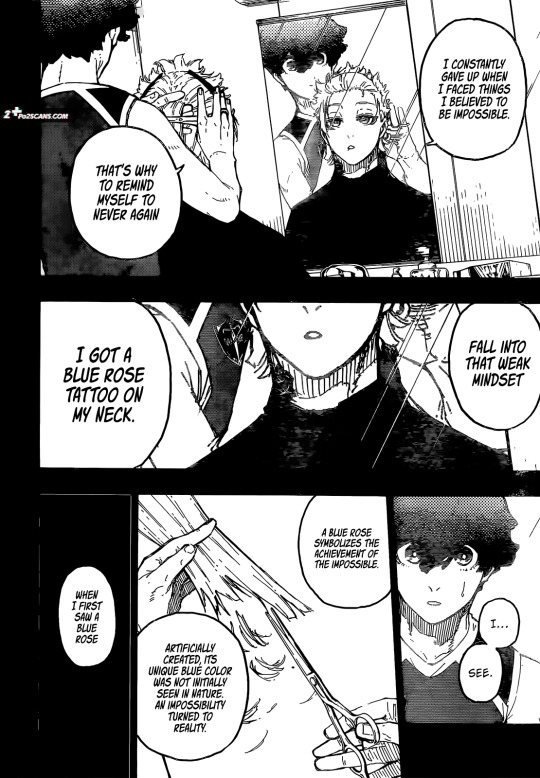
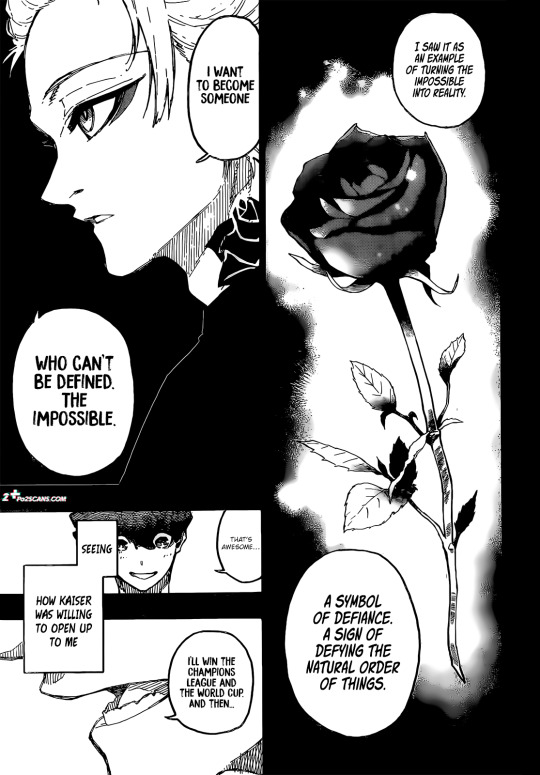
(order of images is top, then left to right. Click on the image to read.)
According to Kaiser, the blue rose symbolizes the achievement of the impossible. A symbol of defiance. But what is he defying?
I was originally a mentally weak person. I constantly gave up when I faced things I believed to be impossible.
Kaiser is defying the idea of being weak, of being helpless, of being trash—an idea instilled in him by his Father.
His curse is his childhood trauma. And the fact that the Rose is blue—representing the impossible—and even tattooed on his skin tells us that this curse is not easy to break.
Point #3: Kaiser may have thought he was reclaiming the surname, but in reality it was just a manifestation of his obsession.
The same way the Father’s obsession over the Mother is manifested in his refusal to call Kaiser by name.

Gathering all the points we have so far:
Point #1: Michael Kaiser is not the boy who was abused. It was the boy who was abused who became Michael Kaiser.
Point #2: To call someone by their given name is to abandon them.
Point #3: Kaiser may have thought he was reclaiming the surname, but in reality it was just a manifestation of his obsession.

Conclusion
Kaiser’s goal is to become impossible to define, but the irony is that his entire name—Michael Kaiser—defines a prison.
Yet, it also concisely sums up his entire life.
And to even live as just the Michael Kaiser was something he had to fight tooth and nail for:
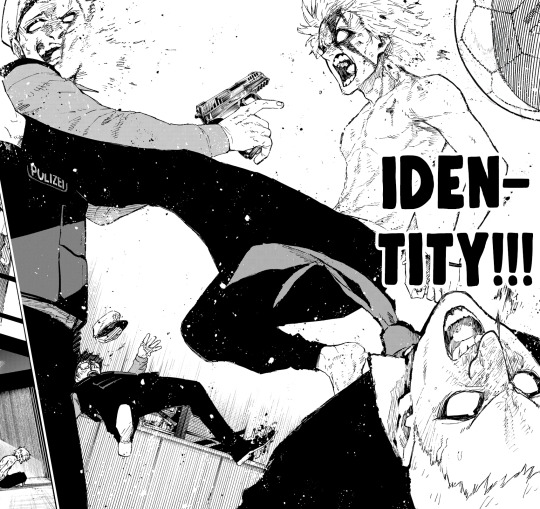

After losing to Yoichi, Kaiser has become even more obsessed over defying the idea that he is trash.
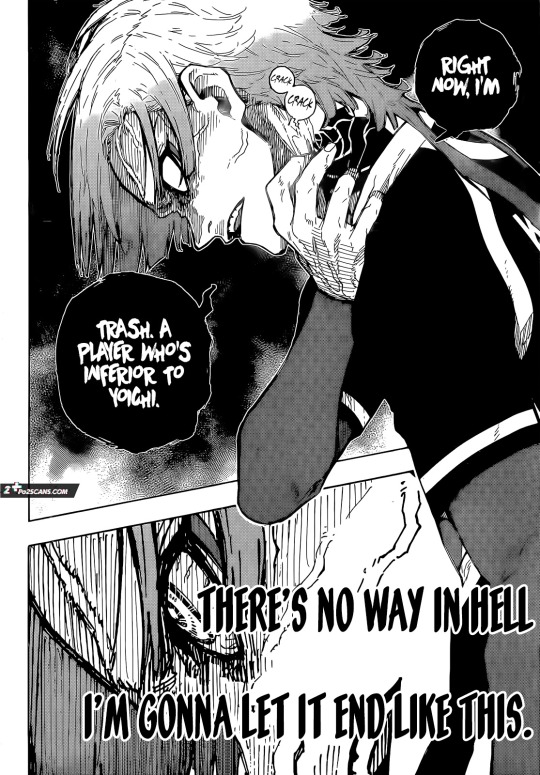
He thinks that the only way to stop being trash is to defeat Yoichi. But this view of winning as the sole affirmation of worth is unhealthy and needs to be stopped.
Kaiser needs to realize that… he never was trash.
He doesn’t have to keep defying anything because there is nothing to defy.
Besides, he has already defeated the “impossible.”
He is no longer the Michael who was abandoned, nor is he the Boy who was abused. But until he realizes that he is not the trash Kaiser like his father, he will never be able to break the curse.
But how does one break the curse, exactly?
Roses represent curses.
But Roses… also represent a search for love.
And Kaiser is already…
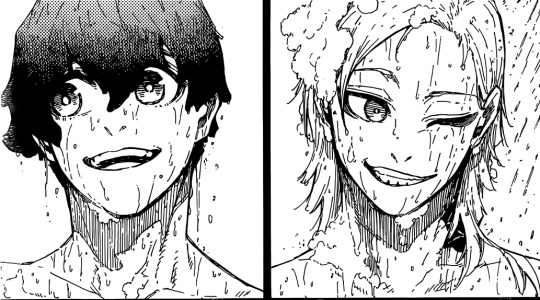
...very much loved.
He just needs to realize it.
#this ended up being longer than expected#started writing at around 6pm and now it’s 2am jshgfjhsdf#michael kaiser#michael kaiser meta#blue lock#blue lock manga#blue lock meta#miyamiwu.meta#miyamiwu.src#bllk#child abuse
151 notes
·
View notes
Text
Batten down the hatches: Rin's ego is about to land
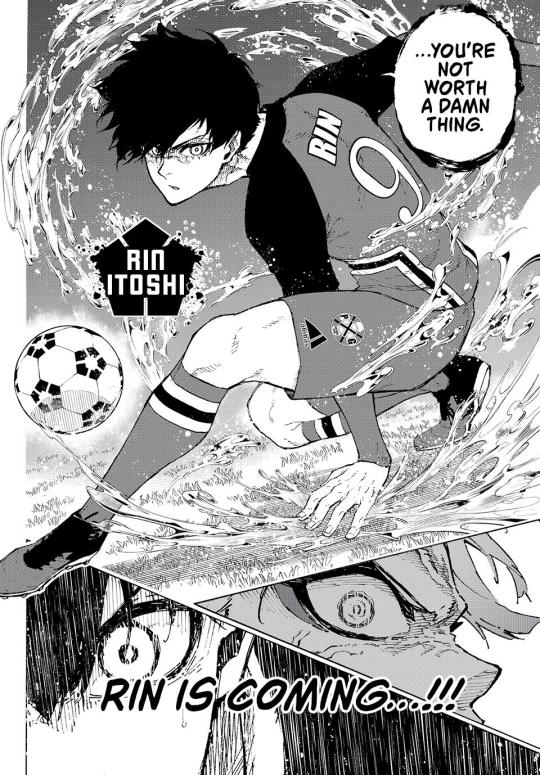
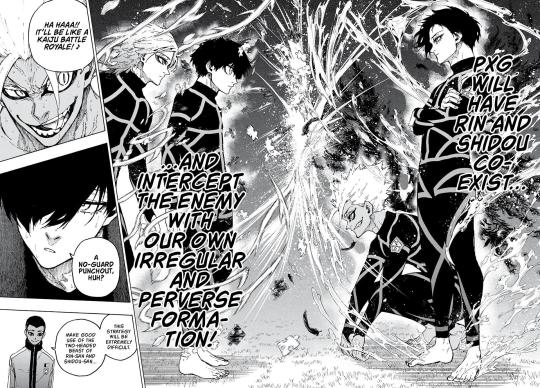
The latest chapters show Rin playing with an unfamiliar aura: what looks like swirling rivulets of water.
This represents the refinement of his ego and playstyle since the under-20 match. But what exactly are they going for with the swirling water? Here's my two cents.

Rin is strongly associated with water, specifically the sea. He grew up by the coast; he and Sae shared a love of watching the sunset over the water after training together. Those childhood memories are turbulent now, like dark clouds on the ocean's horizon.
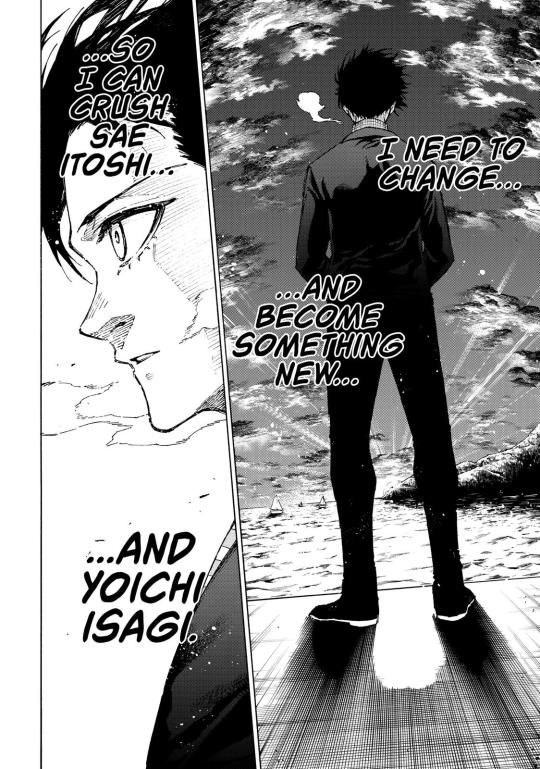
It's here he realises that he can no longer play the puppetmaster football that helped him thrive in Blue Lock. As good as he is, it wasn't authentic... and it's nowhere near where he needs to be to compete with his brother, or even Isagi.
Rin's flow state is the most unique out of any others we've seen. Let's dig into it. All panels are from the official translation, which is important as the translation choices are 1) consistent and 2) likely chosen carefully.
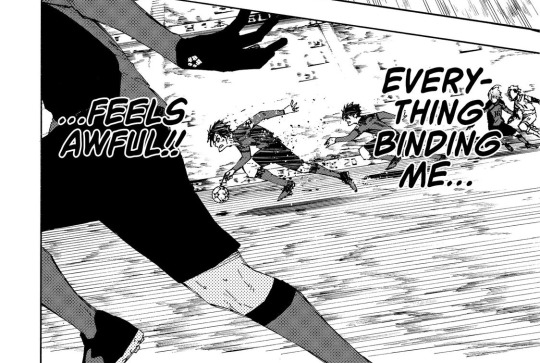
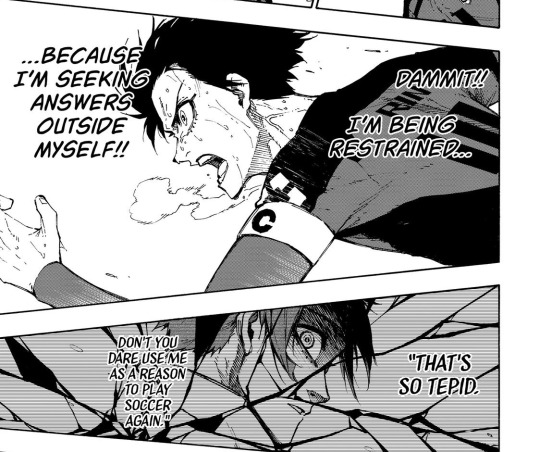
In the dying moments of the match, Rin complains about feeling restrained. Being Itoshi Rin is eating him alive.
Cool, calm and aloof.
A genius. Prodigy. Puppetmaster.
Team player. Team captain.
Isagi Yoichi's partner. Shidou Ryuusei's rival.
Itoshi Sae's little brother.
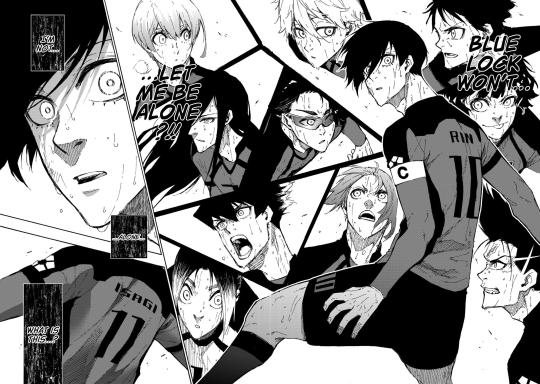
The prospect of defeat rudely wakes him up. His pretence comes crashing down hard, triggered by his ineffectiveness in spite of the teammates around him. It's one of the best rugpulls in sports manga.
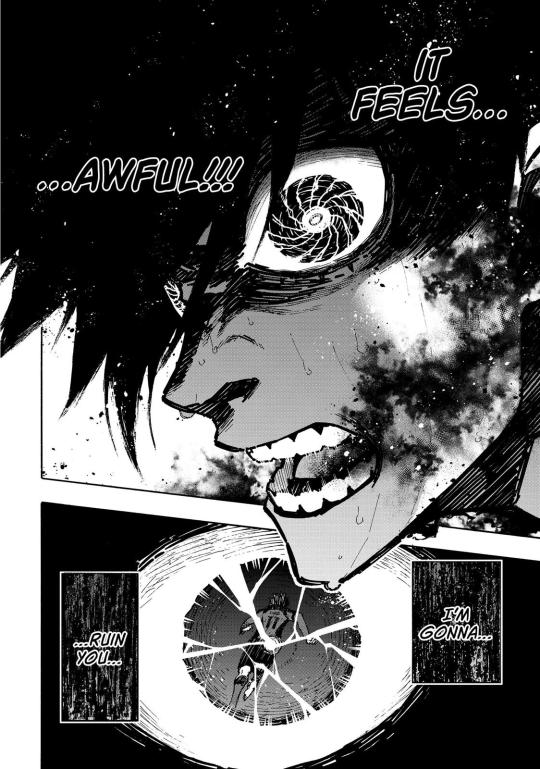
When the power of friendship comes knocking, Itoshi Rin tells it to fuck off and die.
What a glorious moment... and not just because it posits Rin as a Uchiha Sasuke kinnie. I prompt you to examine his eyes in this panel.
They're a swirling vortex of hate and destruction, befitting Blue Lock's angstiest character. The shape reminds me of this:
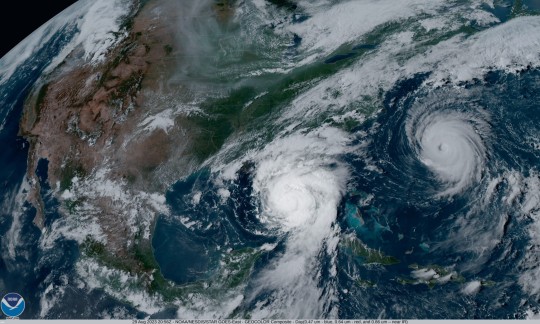
Satellite images of Hurricane Franklin and Hurricane Idalia, August 2023. Image credit: NOAA Satellites.
Rin's true ego, which he unleashes against Sae, is a storm.
youtube
Optional soundtrack for the rest of this post (because Rin 100% listens to this once it comes out in Blue Lock's universe).
Although it isn't portrayed visually as such in the under-20 arc, the metaphor fits Rin's evolving playstyle. What is more destructive, more uncontrollable, more senseless than a hurricane? A violent force of nature that we can predict but never avert?
When a storm approaches, all we can do is rank it, track it, then attempt to mitigate the inevitable damage.
In football terms? Sounds a lot like playing Rin.
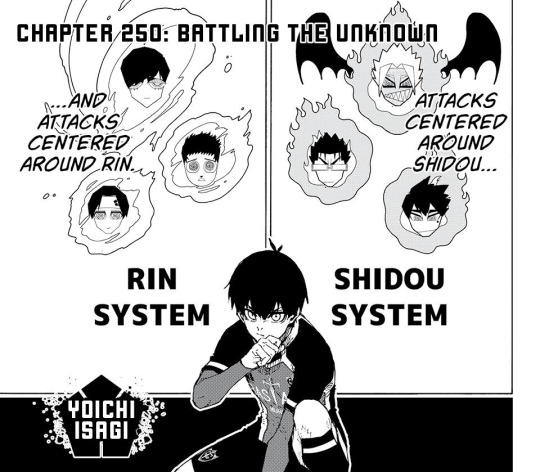
It's even alluded to in chapter 250: the graphics for Rin's formation are similar to the satellite images of large storms.
Within the U20 match, there are exchanges that support this theory. Darai calls Rin's evolving playstyle arrogant and avaricious. The latter (meaning extreme greed) is evocative of a force that pursues what it wants without regard for anything in its surroundings. What it can't have, it destroys.
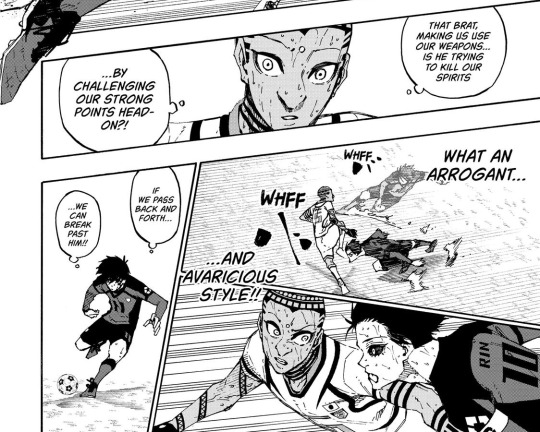
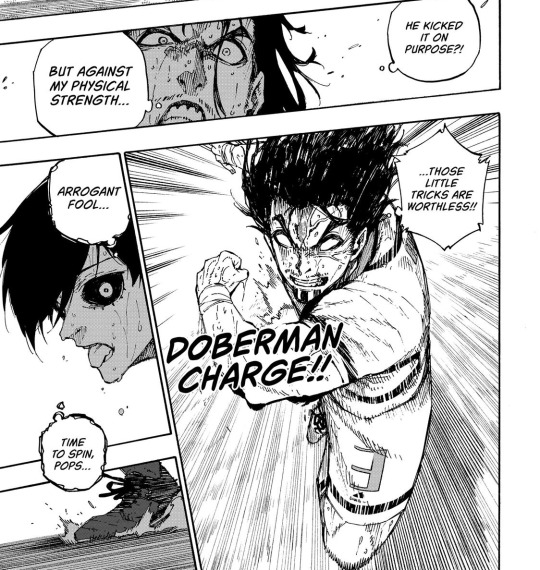
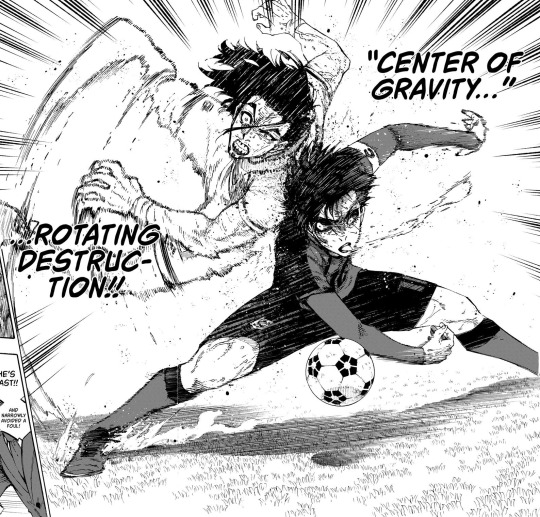
Niou is confident enough in his physicality to try withstand his opponent's attrack. Rin literally flips him into the air. Niou's hubris brings to mind all man-made constructs which are supposedly storm-proof... until a cyclone comes along and proves otherwise.
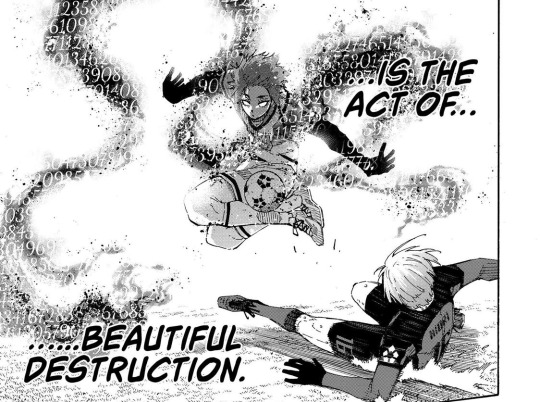
The contrast between Rin and Sae's egos are interesting. If we accept Rin's is a storm, i.e. a destructive force of nature that cannot be controlled, Sae's is the opposite despite being as impossible to defy. Sae's motif is defined in the manga as "beautiful destruction", plays and passes depicted in graceful data strings. Rather than natural, his playstyle is sleek and controlled, and dominant to the point of appearing pre-ordained by his opponents.
Their attitudes are equally different. While Rin drools and loses composure in the final minutes, Sae does little more than raise his eyebrows throughout the entire game. He's completely emotionless.
It's the extremes of human nature: animalistic rage versus robotic detachment. This time, the latter wins. Will Rin have an opportunity to face his brother again, with a better grasp on his ego? Here's hoping.
My final thoughts on Rin are speculative. How does one beat a storm? Not just endure—but subdue and calm one?
It's beyond human capability. The ability to control the weather exists only in myth and fantasy, and even then it's usually in the hands of powerful entities, not mere heroes or wizards.
Subduing something as powerful as a hurricane would require a god.
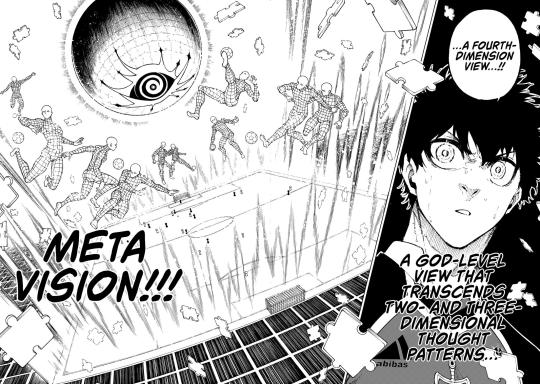
Is this Isagi and Rin's endgame?
Time will tell.
#blue lock#blue lock analysis#blue lock meta#itoshi rin#itoshi sae#isagi yoichi#i missed doing long analysis posts ❤️#this was fun to pull together#bllk analysis#blue lock spoilers#blue lock anime spoilers#boinin talks bllk#mine#long post
245 notes
·
View notes
Text
Luz Noceda and Alexis Ness: The Witch and The Magician


As the story of Blue Lock progressed and I discovered more things about Alexis, I couldn't help but notice that he has a lot in common with Luz Noceda from The Owl House and how he represents what Luz would have been if Luz had not had the positive support of her mother and her friends that allowed her to grow and improve as a person.
Both are people who love magic, fantasy and the inexplicable, but the environment that Luz and Alexis are rejects them for not fitting in to the point of not feeling loved or understood by anyone, not even by their own families.


This was so bad for them that it led them to want to escape from their reality at the first opportunity they had (Luz goes to the Boiling Islands to recover her The Good Witch Azura book and chooses to stay there, Ness witnesses a soccer game where he sees the essence of magic he seeks and joins Bastard München).
However, Luz was loved by her family: Manny knew about his daughter's tastes so he gave her The Good Witch Azura book as a token of his love and support for her, plus he was the one who taught her the sausage trick which shows that he also supported his daughter's eccentricities, Camila loved Luz's eccentricities and the reason she wanted to send her to camp was not out of hatred but because Camila didn't want Luz to suffer the same ostracism that Camila herself suffered when she was younger for being like her daughter and in the end Camila supports and comforts her daughter when Luz needed it most. Even Eda and King count as family since they are like a mother figure and a younger brother figure to Luz who give Luz the validation she wants but give her a kind reality check that she needs, being this the first step that Luz takes towards her personal growth.
Alexis' family, on the other hand, are a family of scientists who rejected their own son for being different from them, they are emotionally cold towards him at best and they insult him at worst, to the point that when Ness starts playing soccer on Bastard München, they expect him to fail.
In addition, Luz also has Amity, Willow and Gus, and thanks to her interaction with them, Luz begins to grow as a person and heal and value herself, but Ness has no one to help him grow as a person, heal and value himself.
As I said before, Luz and Ness left the "ordinary world" for the "magic world" as a way to escape their problems, only to realize that the magic world is no different than the ordinary world and even the people they meet and form bonds with are also complex beings like any other person. However, while Luz meets people who, although at first they are indifferent with her, end up improving their relationship with her and in turn Luz learns to grow as a person and value herself, Alexis only meets people who at best ignore him and at worst manipulate him for their own benefit.
Even Ness' relationship with Kaiser is a twisted and sick version of the relationship Luz has with Amity because Amity and Kaiser are prodigies who have abrasive personalities as a result of being raised in an abusive family and Ness and Luz bond with them because they share things in common with them which makes Luz and Alexis want to connect with them:
Luz and Amity start out distant but Luz's kindness plus the fact that both girls like The Good Witch Azura, makes them both closer.
Ness is someone who believes in impossible things like magic and Kaiser asks Alexis if he believes that the impossible can be possible, this shared belief makes them both team up and score goals and progress as soccer players in Bastard München and if at the beginning they were fighting each other little by little they start to have a closer bond.


Only while Amity really starts to love Luz and improves as a person and supports Luz while Luz supports Amity and Luz grows as a person, Kaiser manipulated Ness, mistreats him and Kaiser doesn't improve as a person nor does he let Alexis improve either.
Curiously, Luz does have her own Kaiser who manipulated her and hurt her:

but what Belos did not count on is that Luz was not alone:



her family and friends are there to defend her and it is her bond with them that makes Luz not succumb to Belos' manipulations and ultimately she is completely freed from him.
But unfortunately Ness does not have the same luck:

People tend to criticize Ness for clinging to Kaiser and on the other hand Luz has a lot of attachment to her loved ones that borders on emotional dependence but what people ignore is that Luz and Ness cling to their bonds with their friends because because they are the first people Luz and Ness feel understand them and give them some kindness and value and, due to their traumas, Luz and Ness cling too much to their bonds and become complacent with them because they are afraid of being alone again, this attachment and fear of losing their loved ones is so great that Luz and Ness are fiercely protective of their loved ones and aggressive towards anyone they see as a threat to them.
In fact, Luz and Ness share the fact that whenever something bad happens to them when it comes to their relationships, they blame themselves for it and that is because, due to the rejection trauma that Luz and Ness suffered, Luz and Ness have low self-esteem to the point that they both unconsciously believe that they deserve anything bad that happens to them and that they are the ones who cause problems and have to fix what they think is their fault, that can be seen by the fact that every time something happens to Luz's friends, Luz tries to fix it even if it ends up risking her life or when Kaiser mistreats Ness he does not react negatively towards Kaiser but Ness simply lets it go or when Kaiser ended up leaving him in his match against PXG, Ness does not complain to Kaiser but he overexerts himself in his plays so that Kaiser takes him into account again.
It is thanks to the bonds that Luz forms that she is able to see her own magic to the point of growing as a person and believing in herself, which allows her to become the good witch she always wanted to be. On the other hand, Ness does not have anyone to make him see his own magic, which prevents him from growing as a person and, by extension, from being able to become the magician he has always wanted to be.
#luz noceda#alexis ness#the owl house#the owl house spoilers#the owl house meta#toh#toh spoilers#toh meta#blue lock#blue lock spoilers#blue lock meta#bllk#bllk spoilers#bllk meta
17 notes
·
View notes
Text
I enjoy Rin Itoshi because we're introduced to him and were lead to believe he's stoic, never ruffled, always in control. he's cool.
And then slowly over the course of the story we learn. oh he's got a mouth on him. oh he's physically incapable of backing down from a fight. oh he's a little fucked up actually. don't even ask about his brother
and then the climax of the u-20 arc happens and Rin's truest, purest, most instinctual flow and form of soccer is a feral drooling monster who intentionally goads other players into using their strongest moves just so he can tear them down. and his tounge is sticking out of his mouth. and he unlocks this flow state when he's hit with the realization of the power of friendship and team spirit and it disgusts him so much his only option is to go beast mode to reject it. his tounge is still out. he is playing soccer for his brother. the idea of playing soccer for his brother and being defined by him is repulsive to his ego. he can't stop defining himself by his brother. his tounge is still hanging out of his mouth by the way.
and he might be a lot fucked up actually.
he is feral he is out of control he is not so above it all. he's a loser. he's THE monster. he's unstoppable. he blinds himself. he's still kind of cool. he's so fucked up.
#itoshi rin#blue lock#blue lock meta#itoshi rin meta#blue lock u-20 arc#oh and hes got a fucked up homoerotic rivalary going on with isagi where they perfectly understand each other and despite/because of this#they live to outsmart and outplay and devour each other#all you have to do is look at me 👀 i know what you are sports manga...
32 notes
·
View notes
Text
heyyy, guess who’s back with more thoughts about itoshi rin????
so, we’ve already established that rin is a very extrinsically motivated person, at least when it comes to football. he doesn’t play football for himself, and he never has. and in a setting like blue lock i just don’t think that’s a sustainably way to play football. blue lock is a place that wants people have a real love for the sport, and would play it every single day of their lives if they could. ego wants people who want to win and want to be the best striker in the world.
rin,, doesn’t really want that. sure, he wants to beat isagi and prove his brother wrong, but that’s not really a longterm, sustainable goal. what happens when he succeeds? does he just stop and say, “okay, that’s good enough”? what happens if he never succeeds? if isagi just continually gets better and better and rin never beats him in a way that makes sae acknowledge him?
having extrinsic motivations is good and normal, but you also eventually have to do things that you want to do for you or you’re going to get burnt out. and i feel like that’s the path that rin’s headed towards if we’re being realistic about this. he just goes and goes and goes in a really unsustainable way, and eventually it’s going to catch up to him.
he’s a really interesting foil to isagi, who’s motivations are almost entirely intrinsic. part of why isagi’s mindset feels more sustainable to me is because he really only plays football for himself. he plays because he really loves the sport. and we don’t ever really see that in rin, so i feel like it’s eventually going to kind of blow up in his face as we’ve seen in previous rounds of blue lock.
or i’m entirely wrong about this. idk, i’m not kaneshiro. i’m just saying that i don’t think that rin’s got anything sustainable going on in how he plays football ¯\_ (ツ)_/¯
#original post#blue lock#itoshi rin#rin’s really good at football#that’s why he’s survived in blue lock for so long#i just don’t think that being really good at football is all that ego’s looking for in a striker#also#jsyk#i love rin so so so much#he’s my special little boy#i just also think that maybe just maybe he should find a reason to play football for himself before he burns out and decides to never play#again#he doesn’t seem like he really enjoys the sport anymore#and that makes me sad#because he deserves to have fun with the thing that he’s apparently going to spend the rest of his life doing#he’s only sixteen#he deserves to enjoy the life that he’s living#isagi yoichi#ig#he was mentioned#i feel like i talk a lot#get him on a volleyball court with hinata and kageyama#they’ll force him to find some enjoyment with what he’s doing#okay i’m done#does this count as meta?#meta post#blue lock meta#okay for real this time#bye
22 notes
·
View notes